










Traverse City Office 236 1/2 E. Front Street, #26 Traverse City, MI 49684 231-943-6988
Main Office 5931 Oakland Drive Portage, MI 49024 269-385-5888 or 888-777-0216
• We uphold a Fiduciary Standard and work with clients on a fee-only basis.
• We do not receive commissions, kick-backs, or soft dollars from product sales, eliminating inherent conflicts of interest.
• Our team of professionals holds designations and degrees such as CFP®, CFA, CPA, MBA, JD, and PhD.
• Charles received his MBA from the Kellogg School of Management - Northwestern University, his MA in Economics from WMU, and Executive Education from Harvard Business School and Columbia University. Charles Zhang, CFP®, MBA, MSFS, ChFC
• Ranked #1 on Barron’s list of America’s TOP Independent Advisors for 2024. Charles has achieved the #1 ranking three times within the past four years.*
• Ranked #4 in the nation on Forbes’ list of TOP Wealth Advisors and is the highest-ranking Fee-Only Advisor on the list.*
Minimum investment: $1,000,000 in Michigan/$2,000,000 outside of Michigan. Assets under custody of LPL Financial and Charles Schwab.

TRANSPLANT CLINIC OPENING
Trinity Health Grand Rapids is expanding its five decades of kidney transplant experience to northern Michigan by opening a new satellite clinic in Traverse City. The clinic will eliminate at least one visit to Grand Rapids for northern Michigan patients at the Trinity Health Grand Rapids Kidney Transplant Center, the only adult kidney transplant center in west Michigan The clinic will be located at Munson Healthcare Kidney & Hypertension Specialists in Traverse City.

EXIT OFFICES MERGE
Holly Hack, broker/owner of EXIT Realty Paramount, and Stephen Karas, broker/owner of EXIT Northern Shores Realty, have announced a strategic merger. “Unifying the EXIT offices in Elk Rapids, Kalkaska and Traverse City, along with our current property management for the Traverse City Horse Shows through Winterwood Property Management, brings a cohesive strategy of real estate to northern Michigan,” said Stephen Karas, who has co-owned the Northern Shores franchise with wife, Carol Karas, since 2006 and since 2022 with associate broker, Vickie Smith. Holly Hack has been the sole owner and broker of EXIT Realty Paramount since 2011. Once finalized later this summer, the newly-merged company will operate under the EXIT Northern Shores Realty name with Stephen Karas as the broker of record.
MOVE: TRAVERSE BAY
INTERNAL MED
Traverse Bay Internal Medicine has relocated to 3963 W. Royal Dr. in Traverse City. The practice has also expanded its team to include two new internists, a gynecologist and two physician assistants. “This move is part of our ongoing effort to better serve the Traverse City community and accommodate our growing practice,” said owner Dr. Angela Pohl.
MICROLOAN RECIPIENTS
ANNOUNCED
Crosshatch Center for Art and Ecology and Oryana Community Co-op have announced the 2025 recipients of their zero interest microloan program: Open Air Farms in Cedar and Traverse City’s Carter’s Compost. Open Air Farms, which produces vegetables and flowers
sold at farmers markets, retail stores and via its community supported agriculture program, will use $7,000 to upgrade its wash/pack facility. Carter’s Compost, which collects food waste, composts it and then returns to customers, will use $3,000 to upgrade its food waste collec tion infrastructure.
AAF - Northern Michigan, the newest chapter of the American Advertising Federation, recently celebrated the work and accomplishments of local advertising professionals and students at the Ameri can Advertising Awards (ADDY) show in Traverse City. Work was judged by a na tional panel of top creative professionals. Professional firms that received recogni tion include PB&J Creative, LeadPlan Marketing, and Image 360

E-bike retailer and renter Pedego Traverse City has added new brands, services and offerings, and is also announcing a new name: Pedego & More Traverse City. Located at 823 S. Garfield Ave., the shop has added new e-bike brands, including Urtopia and Blaupunkt, and is also now a full-service parts and repair center. It has also added Outmore Living battery-powered heated outdoor furniture to the store. Doug Clemens has joined as sales manager and chief fun officer. Former Grand Traverse Cycle owner and founder Matt Klingelsmith has been with the company for four years and will lead e-bike service efforts.
Six businesses and six community professionals have been named finalists for the 2024 Traverse Connect Business and Community Achievement Awards. Finalists for TCYP Member of the Year are: Alexis Chas, product marketing manager at Beneteau Group; Brayton Farr, director of events & member engagement at the Home Builders Association of Northwest Michigan; and Mallory Szczepanski, event and content producer at Recycling Today Media Group. Finalists for Leadership Grand Traverse Alum are: Cindy Evans, executive director at Grand Traverse Industries; Alison Metiva, chief operat-
















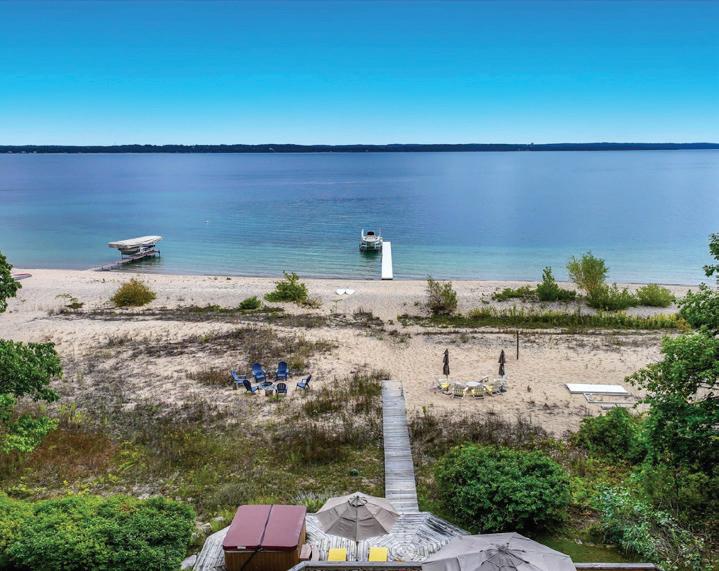














ing officer at Grand Traverse Regional Community Foundation; and Madeline Saucedo, director of fund development at Traverse Bay Children’s Advocacy Center. The Economic Impact finalists are: Century, LLC; Cherry Republic; and Grand Traverse Industries. Best New Business finalists are: Bushell’s Kitchen + Cocktails and Dreloco Taco; FreshTrippin; and River Club Glen Arbor Award recipients will be selected through live voting at the Distinguished Service Award Luncheon at the Grand Traverse Resort & Spa on May 21.
Time2Shine Fitness is now serving clients in the Traverse City area. Founder Kim Goodrich provides one-on-one personal training, nutrition coaching and lifestyle support, with each program designed around the client’s needs and goals. Sessions are available at Gateway Fitness Gym, in a private studio or in the client’s home. Learn more by calling (231) 625-4808 or emailing kim@thetimetoshine.com.

Apparel and lifestyle brand M22 has opened its third store, adding Suttons Bay to its flagship retail location in downtown Traverse City and a second store in Glen Arbor. Founded by Matt and Keegan Myers in 2004, the new store is located at 305 N. Saint Joseph St., formerly occupied by Laughing Fish Gallery. The Folded Leaf , a new independent bookstore, has opened in downtown Cedar, across the street from the Cedar Tavern. Owner Rachel Zemanek also intends to sell plants and artwork at the store, and to host live music and other events there on Wednesdays and Saturdays. Finally, Baby Dill has opened inside the Mercato at The Village at Grand Traverse Commons. The shop – owned by Tracey Lark, who previously owned and operated Relish in Traverse City for the last 13 years – will focus on natural and organic items for babies, young children and moms.

Dune Bird Winery in Northport has announced a collaboration with the Friends of Sleeping Bear Dunes nonprofit organization. This collaboration is marked by the release of Pink Plover – a sweet rosé crafted to raise awareness and funds for the endangered piping plover and other resource protection efforts along Lake Michigan’s shorelines. “This partnership allows us to bring together our love for wine and our commitment to environmental conservation — not only in our vineyards and wine making, but also in our communities and along our shorelines,” said Bekah Bell of Dune Bird Winery.

The St. Clair Butterfly Foundation (SCBF), a nonprofit organization that provides mentorship programs, life skills, and builds character through the creative arts, is expanding into the Traverse City region. With nearly two decades of success in transforming trauma into healing, SCBF delivers neuroscience-backed, expressive arts programming and professional development that goes beyond behavior management to create lasting behavior transformation. “Our mission is to empower schools, courts and other front-line workers serving the community to become healing-centered environments,” said SCBF co-founder Lisa St. Clair.


got your back! Our thoughtful and knowledgable
agents are here to make sure you're covered from head to toe— protecting what matters most, no matter the





















Traverse City is on a roll. From our dynamic downtown to the freshwater landscape that surrounds us, this region is a magnet for people seeking more than just a place to live – they’re looking for a place to thrive.
What’s fueling that momentum? Of course, it starts with people – our business leaders, educators, civic institutions, and bold thinkers. But behind the scenes, a powerful driver often goes overlooked: strategic public investment. These foundational dollars are quietly building the infrastructure, programs and community assets that are making private investment not only possible but irresistible.
When we talk about investing, we often think in personal terms: capital, risk, return. But public investment operates differently – it sets the table. It creates the conditions that attract private sector dollars, amplify them and deliver longterm community value. Public dollars cover costs that the private sector can’t or won’t because there’s rarely an ROI, whereas these investments in the shared goals and objective of our community are government-money sweet spots.
Take FishPass, for example. What might appear to be just a revitalization of aging infrastructure is actually a globally significant research and environmental project. Located on the Boardman/Ottaway River, FishPass integrates fisheries management, scientific research, invasive species control and environmental education, all in one state-of-the-art facility.
This wouldn’t be possible without a diverse mix of funding, including major
EDITORIAL & BUSINESS OFFICE
P.O. Box 4020 Traverse City, MI 49685 231-947-8787
ON THE WEB tcbusinessnews.com
PUBLISHER
Luke W. Haase lhaase@tcbusinessnews.com
CONTRIBUTING EDITOR
Gayle Neu gneu@tcbusinessnews.com
HEAD WRITER
Craig Manning
STAFF WRITER
Art Bukowski
COMMENTARY BY GABE SCHNEIDER
support from the Great Lakes Fishery Commission, federal agencies like National Oceanic and Atmospheric Administration, the State of Michigan and local partners such as the City of Traverse City, the Traverse City Downtown Development Authority, and the Grand Traverse Band of Ottawa and Chippewa Indians.
In fact, just last year, state legislators appropriated an additional $1 million to advance the project. This stack of public commitments has already begun to attract global partners investing in research, technology and education to our region.
FishPass is just one example. The Freshwater Research and Innovation Center (the Center) is another transformative project bringing national and international attention – and capital –to Traverse City. A collaboration between Northwestern Michigan College, Traverse Connect, 20Fathoms, Discovery Center & Pier and Michigan Technological University, the Center is being developed as a hub for freshwater and marine innovation on West Grand Traverse Bay.
Fueled by a $15 million allocation from the Michigan legislature and $1.6 million in federal funding, the Center is already drawing interest from companies in advanced manufacturing, PFAS mitigation, marine sensor development and electric boat technology. This isn’t speculative – it’s already happening.
These projects reflect a powerful truth: public investment builds confidence. Policymakers didn’t fund FishPass or
CREATIVE DIRECTOR Kyra Cross Poehlman
CONTRIBUTING WRITERS
Ross Boissoneau
Kierstin Gunsberg Rick Haglund
COPY EDITOR Becky Kalajian
WEB PRODUCTION: Byte Productions
MAILING/FULFILLMENT
Village Press
DISTRIBUTION
Marc Morris
SERVING
Grand Traverse, Kalkaska, Leelanau and Benzie counties
the Center because of their novelty; rather because they leverage our assets and strengths: environment, talent and capacity to work together.
As the region continues to grow, high-quality healthcare access becomes more than a social priority – it becomes an economic one. The Grand Traverse Mental Health Crisis and Access Center is a prime example of how public investment is delivering real value on both fronts.
This new facility, a partnership between Munson Healthcare and Northern Lakes Community Mental Health, was funded by $5 million in American Rescue Plan Act funds and an additional $5 million from the State of Michigan targeted at pediatric mental health services.
Currently operating Sundays through Thursdays with 24/7 crisis phone support, the center will soon offer aroundthe-clock, in-person care for children and adults, regardless of ability to pay.
This is the kind of local, state and federal investments that supports families, strengthens our workforce and enhances the long-term viability of our community. Access to behavioral health services isn’t just a moral good. It’s an economic development strategy.
Public investment is working in Traverse City. These initiatives are not only creating high-value jobs and increasing property values, they’re making this re -
AD SALES
Lisa Gillespie lisa@northernexpress.com
Kim Murray kmurray@tcbusinessnews.com
Kaitlyn Nance knance@northernexpress.com
Todd Norris tnorris@tcbusinessnews.com
Abby Walton Porter aporter@northernexpress.com
Michele Young myoung@tcbusinessnews.com
gion a national model for collaborative, place-based economic development. But that momentum is fragile. At the federal level, growing concerns about efficiency, waste and fraud are slowing the flow of public dollars into projects like these, in communities like ours. Efforts to cut federal spending could eliminate Medicaid coverage for patients who need care. That’s a real risk – not just to funding, but to people and the collaborative model we’ve built here.
Traverse City’s continued success depends on strong partnerships between all levels of government and the private sector. Policymakers continue to support this region because they see something rare: a shared vision, a willingness to innovate and a proven ability to deliver.This is not a go-it-alone community. It’s an all-of-the-above strategy and it’s paying off.
For all of us, if you live here, visit here or are interested in being a part of Traverse City’s business and investment community, this is your moment. Public dollars have laid the groundwork – now it’s time to leverage those investments and build something enduring.
Whether you’re an entrepreneur, investor, developer, or philanthropist, there’s room at the table. You have the opportunity to invest not just in profit, but in place – in people, in innovation and in a regional economy built to last.
Gabe Schneider is a consultant, policy strategist and founder of Northern Strategies 360. He lives, works and invests in Traverse City.
The Traverse City Business News Published monthly by Eyes Only Media, LLC P.O. Box 4020 Traverse City, MI 49685 231-947-8787
Periodical postage qualification pending at Traverse City, MI.
POSTMASTER: Send address changes to The Traverse City Business News, PO Box 1810, Traverse City, MI 49685-1810.
The Traverse City Business News is not responsible for unsolicited contributions.
Content ©2025 Eyes Only Media, LLC. All rights reserved.
EYES ONLY MEDIA, LLC

Fueling Michigan today and tomorrow.
Every day, Michiganders depend on secure, reliable energy to heat their homes, fuel businesses, and power industries. Enbridge proudly delivers 55% of the propane used in Michigan.
We continue to modernize our energy infrastructure and further protect the Straits of Mackinac crossing by investing in the Great Lakes Tunnel.
As a North American integrated energy company, we’ve been delivering the energy the state needs for decades and we’re investing in Michigan communities and infrastructure. It’s how we’re building toward a better tomorrow.
Discover more at enbridge.com/Michigan.
By Art Bukowski
Meagan Luce is a broker/owner at CENTURY 21 Northland, which has 74 agents and multiple offices serving northern Michigan. She’s the first in our ongoing “From The Desk Of” series to not have an actual, permanent office. She likes to be mobile, and for this feature set up in some unused space in her company’s Traverse City office. We appreciate Meagan showing us around, and we welcome ideas for additional From The Desk Of ideas at abukowski@tcbusinessnews.com.

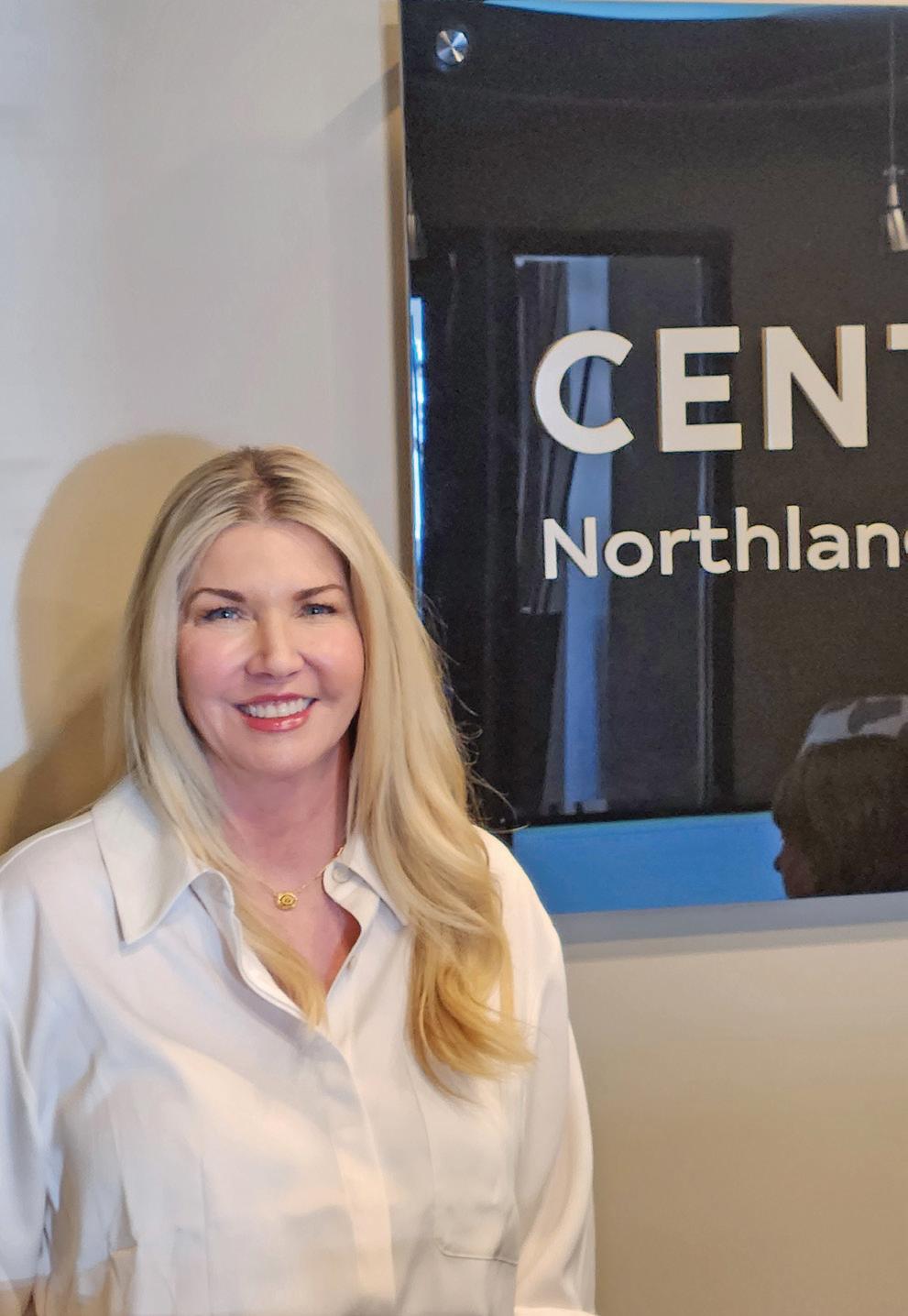
1. This note reminds me to pull stats. I’m always running stats and teaching agents how to run stats. They’re significant because they will show trends before the public or even our agents fully understand them. You need to know statistics if you’re a Realtor.
2. I’m using this notebook to help teach myself Portuguese. My girlfriends and I are going on a golf trip to Portugal this year, and this is where I’m putting things as I learn. I’m using my notebook for basic words and phrases. It helps me keep my thoughts clear as I’m taking lessons.
3. I talk about my girlfriends a lot. One of them is my business partner, Julia (Lilley). She and I are both very strong women, and we love encouraging other strong women. So we started a book club end asked other women to join us. It’s all about self growth and business growth. We read a book each month, then we sit together and talk about how we’re going to implement what we learned into our business lives and personal lives.
4. Those are my little babies. Lauren is now 22 and Alexis is 20. This is my favorite picture because it’s when they loved to cuddle me. Now it’s just when they want to, if they’re in the mood. It used to be whenever I wanted it!
5. In the United States, and globally, each Century 21 is individually owned. We’re usually one of the top one or two offices in the state of Michigan in terms of sales and customer satisfaction. Not only are we a high volume brokerage, but our agents also get very high reviews from customers. Nationally, we are in the top 10 percent of companies for these metrics.
6. I grew up with my mom golfing. She shot 36 holes a day. I just started three years ago, and I’m obsessed. My mom got me this little golfer because she was so excited.
7. I have a little dog. Her name is Pepper, and we’re all obsessed. She’s seven, and she’s fat and sassy – totally spoiled rotten. My daughter made this little model of her.
8. I’m super proud to be an owner and leader in this industry. I think it’s the best industry you could be in. We’re completely engaged with the community, and we’re advising people on the biggest sale or purchase of their entire lives. At Century 21 Northland we make sure our agents are the most professional, most ethical, most well-educated agents in the industry. We don’t have to worry about the consumer; we know they’re taken care of.
PRESENTED BY KEEN


KEEN has had the pleasure of implementing energy efficiency solutions throughout OPTITEMP facility in areas such as their production, warehouse, and front offices.
Installing LEDs to provide brighter, more consistent light with better color accuracy. These LEDs are far more durable and environmentally friendly, lacking hazardous materials and producing minimal heat. Making LEDs a smart and sustainable choice for any space.









Here it is, our annual list of the region’s top 50 single-family residential sellers in the five-county area and top 10 commercial sellers.
2024 was another banner year for northern Michigan real estate sales, as reported by The Ticker in January. Residential sales for 2024 in the five-county area more or less followed the same year-over-year price jumps experienced in the last half decade. According to real estate group Aspire North, 2024 closed with an average residential sale of $542,681 and a median sale of $399,975 across 2,506 sales (up from $502,697 and $380,000 in 2,538 sales in 2023).
Editor’s note: For the past eight years the TCBN has published the ranking for single-family residential sales in Grand Traverse, Leelanau, Benzie, Kalkaska and Antrim counties by local sellers. The ranking is based on the official MLS data provided by Realtors to their regional association. TCBN did not receive any MLS database access nor any information directly from Aspire North Realtors or Northern Great Lakes Realtors MLS for these rankings. Data is published as provided with no changes or manipulations. Those with an asterisk, in the top 25 only, are Realtors in 2024 who worked as a “team,” where properties sold by 2+ individuals are listed under one person’s name.

1
2 3 For commercial-only sales, see the list on page 15.
DONALD FEDRIGON RE/MAX of Elk Rapids, $56.9M

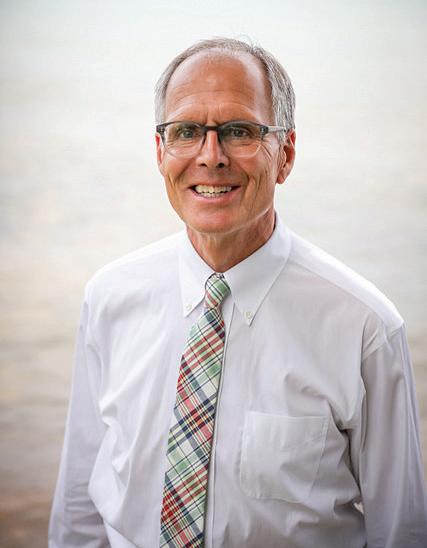
SAM FLAMONT * The Mitten Real Estate Group, $53.6M






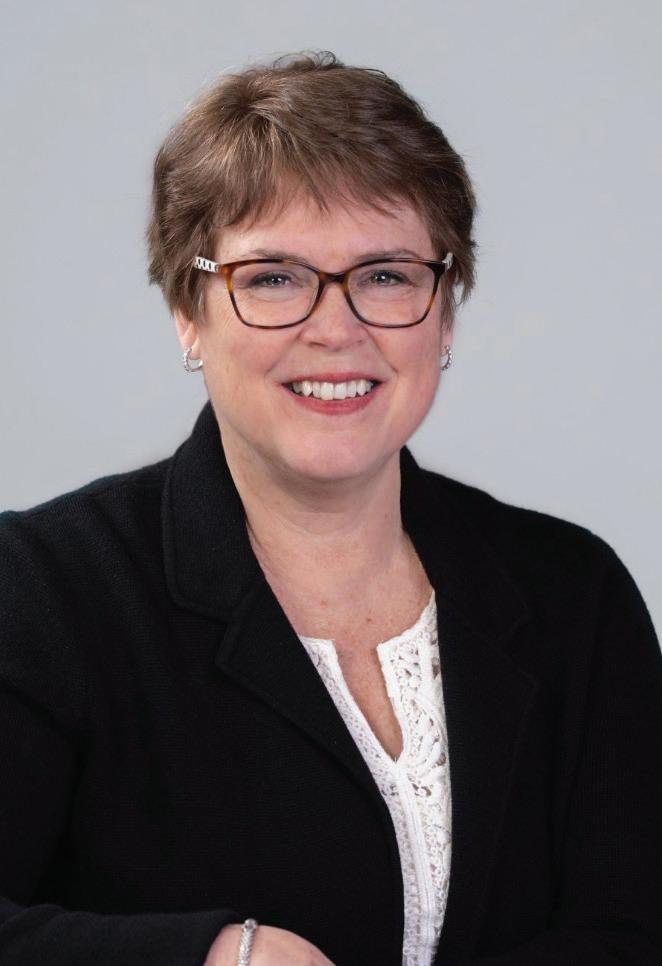






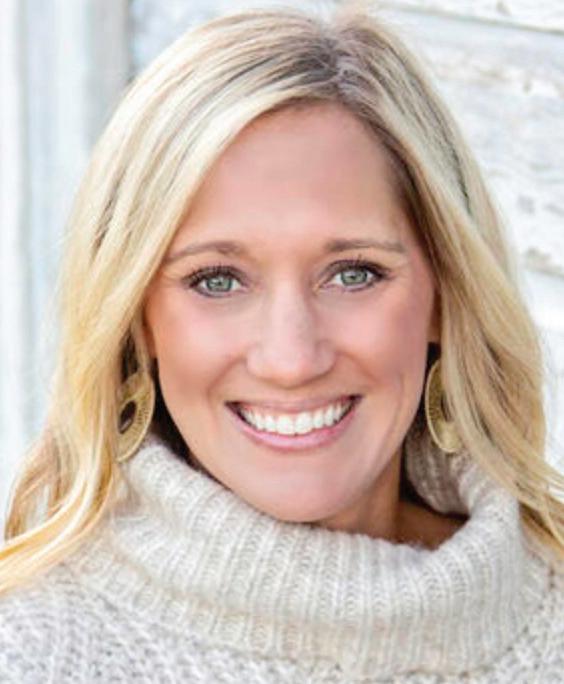














Atlanta - ATL
Boston - BOS
Charlotte - CLT
Chicago - ORD
Dallas/Fort Worth - DFW
Denver - DEN
Detroit - DTW
Fort Lauderdale - FLL
Houston - IAH
Minneapolis - MSP
Newark - EWR
New Haven - HVN
New York - LaGuardia - LGA
Orlando/Sanford - SFB
Philadelphia - PHL
Phoenix/Mesa - AZA
Punta Gorda - PGD
Tampa/St. Pete - PIE
Washington DC - Dulles - IAD
Washington DC - Reagan - DCA
Cherry Capital Airport
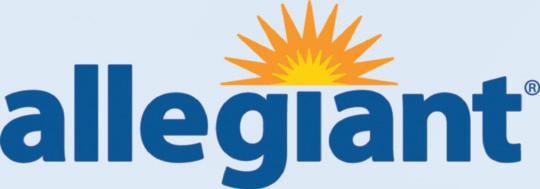












26. RYAN CRAIG @properties Christie’s Intl. $17.6M
27. CORLISS BEUERLE Century 21 Northland $17.6M
28. STEVE SCHEPPE Viewpoint Realty $17.4M
29. CHRISTINE STAPLETON Stapleton Realty $17M
30. MATTHEW GEIB Viewpoint Realty $16.9M
31. BEN STREET Coldwell Banker Schmidt $16.7M
32. TAMARA MCLEOD HELSEL City2Shore Real Estate-NM $16.6M
33. TED SCHWEITZER Real Estate One $16.2M
34. AUBREY VANDEMARK The Mitten Real Estate Group $16.1M
35. GARY SCHEITLER Paradise Properties USA $16M
36. THOMAS ALFLEN EXIT Realty Paramount $15.5M
37. ROBIN VILTER Five Star Real Estate $15.4M
38. JONATHAN OLTERSDORF Oltersdorf Realty $15.3M
39. PAM DEPUY The Martin Co. $15.1M
40. ERICA MOHR Real Estate One $14.8M
41. KATHY WITTBRODT Wittbrodt Waterside Properties $14.8M
43. JENNIFER GASTON RE/MAX Bayshore $14.6M
44. TIA RIECK Coldwell Banker Schmidt $14.5M 45.
To live longer and healthier isn’t always lucky or by accident. Thankfully, we can identify the markers of longevity and start working backwards from there to slow down aging. Aevitas Medical is a “Medicine 3.0” practice in Traverse City that crafts personalized roadmaps to optimal health, designed specifically for your unique biology and lifestyle goals. We move beyond simply treating illness to actively optimize your health through advanced diagnostics, preventative strategies, and evidence-based interventions that traditional healthcare can overlook.
How is Aevitas Different?
The name ‘Aevitas’ draws from the Latin word for ‘eternity’ or ‘age,’ perfectly capturing our mission of extended, vibrant living. Our cutting-edge medical practice features state-of-theart equipment and advanced diagnostic testing, all housed in our premium facility with breathtaking views overlooking the Bay in Traverse City.
We assess our clients through comprehensive testing to precisely measure their longevity markers. Our evaluation includes body composition analysis via Dexa Scan, VO2 Max measurement, age-appropriate strength assessment, and optional advanced cardiovascular labs, hormone panels, and more.
Traditional “Medicine 2.0” waits until you’re sick to help. That’s not us. At Aevitas, we work to proactively optimize your health at every age. And let’s be honest— there’s no magic pill. Getting healthier takes expertise, guidance, and some effort. That’s exactly why we’re here.
Who started it?
Aevitas Medical was founded by a group of innovative doctors in Traverse City who want to push medicine forward. Our team includes physicians from Internal Medicine, Radiology, and Plastic Surgery.
You’ll be seeing Dr. Jeffrey Valice, the primary physician at Aevitas. He personally meets with all patients and brings impressive credentials—he’s a Certified Clinical Lipidologist and working towards becoming a Menopause Society Certified Provider, with extensive background in Exercise

Science and Fitness. His journey into longevity medicine started when he was helping loved ones live healthier lives.
What is your approach?
We’re pioneering Medicine 3.0—a game-changing approach to maximize both how long you live and how well you live. Instead of just reacting to disease, we proactively optimize your health using advanced diagnostics. We use comprehensive biomarker panels and genetic analysis instead of general recommendations, apply data-driven protocols tailored to your needs, address the biological mechanisms of aging, and spot problems before conventional medicine would even notice them.
You’ll get hour-long appointments, direct communication with your doctor, and specialized testing that uncovers hidden health risks—truly transforming healthcare from just managing disease to actually optimizing your health.
What services do you offer?
Think of benchmarking as your health starting point. This two-day deep dive shows where you stand today and where your health is headed. You’ll get a review of your medical history

and detailed blood work, a 90-minute testing session (VO2 max, DEXA scan, metabolic and strength testing), a personalized health assessment including a custom booklet, and a one-hour sitdown with Dr. Valice to make a plan. This service runs $3,000—significantly less than similar services elsewhere.
Our primary care patients get both cutting-edge longevity optimization and concierge care, including direct text messaging with Dr. Valice, same-day appointments when needed, access to our complete testing suite, and unlimited visits. Membership is $7,500 per person per year (potentially lower for couples or families). We keep our patient numbers limited to ensure personalized attention.
Our Executive Health Physical goes beyond benchmarking with additional cardiac and cognitive testing and a complete physical exam, all completed in one day. This service rivals what
you’d find at major health centers like Mayo Clinic, but with more personalized attention and longevity expertise.
We work with patients from 18 to 80+ years old. While starting earlier helps, we welcome people at any stage of their health journey. We take clients who have medical problems already and love to work with any level of health to optimize. All of us deserve the best chance at longevity.
As Dr. Valice says, “Investing in your health is the ultimate retirement savings plan. Being wealthy with poor quality of life isn’t what most of us want as we age.”
As we get older, health declines more rapidly, making optimization increasingly important. While insurance doesn’t cover these services yet, many patients use HSA funds. Consider it an investment to prevent the much higher costs of managing chronic disease later.
For more information, call (231) 2013376 or visit www.aevitasmedical.com


RECOGNIZING OUR TEAM
TCBN 40 UNDER 40
TOP 3 INDIVIDUAL AGENT REMAX BAYSHORE
• NEW TEAM OF THE YEAR REMAX BAYSHORE

The Live Traverse City Team is proud to announce it s partnership with PoWeR Book Bags! PoWeR Books Bags! is a volunteer-run nonprofit in Northern Michigan that boosts childhood literacy by providing free book bags filled with bo oks, writing tools, and playful materials to children—especially those in need—encouraging them to play, write, and read. Their mission is to help kids grow through language-rich experiences that build communication, connection, and confidence. A portion of all procee ds are donated directly to this 501(c)(3).


By Art Bukowski
There’s always something fun on the market in northwest Michigan. Here’s a look at some notable listings throughout the region. While these were active at the time this story was written, we can’t guarantee they weren’t already snapped up by the time this issue went to press!

501 Michigan Ave., Frankfort
Here’s a rare opportunity to own one of those homes up on the big bluff immediately north of Frankfort, and this is a particularly majestic example. This seven-bedroom, eight(!!)-bath, 4,800-square-foot home offers stunning panoramic views surrounded by a landscape that’s matured over the 90-year life of the home. Despite its age, the home offers dazzling mid-century modern details, “flawless” wood flooring throughout and many other updated amenities. The home’s location and surrounding landscape make it particularly secure from erosion issues that threaten other parts of this bluff.
$2.4 million
MLS#: 1931537

106 Oak St., Elk Rapids
$4.2 million

9500 Wilamont Circle, Mancelona
$579,000
MLS#: 25008923
Touted as “the pinnacle of waterfront living,” this 5,300 square-foot home has 350 feet of private shoreline and the perfect angle for blazing sunset views. It’s positioned on a slight point and is only four blocks from downtown Elk Rapids, giving it the perfect mix of lakefront seclusion and small-town charm. The expansive home was built in 1900 and is a nice blend of rich, opulent historical charm (ornate wood carving is featured throughout) with modern updates like heated floors and a loaded kitchen.

Looking for something different? Get in on the shipping container craze! This 2022 home was built using three 40foot shipping containers. It features a ground-level patio with an outdoor dining area, wood fire pit, gas grill and a six-person hot tub. A spiral staircase leads to a spacious rooftop deck, perfect for relaxation with outdoor furniture and a propane fire table. Inside, the open-concept design offers a contemporary and inviting living space with three bedrooms and two full bathrooms. Perfect for a personal getaway or to keep as a successful short-term rental investment.
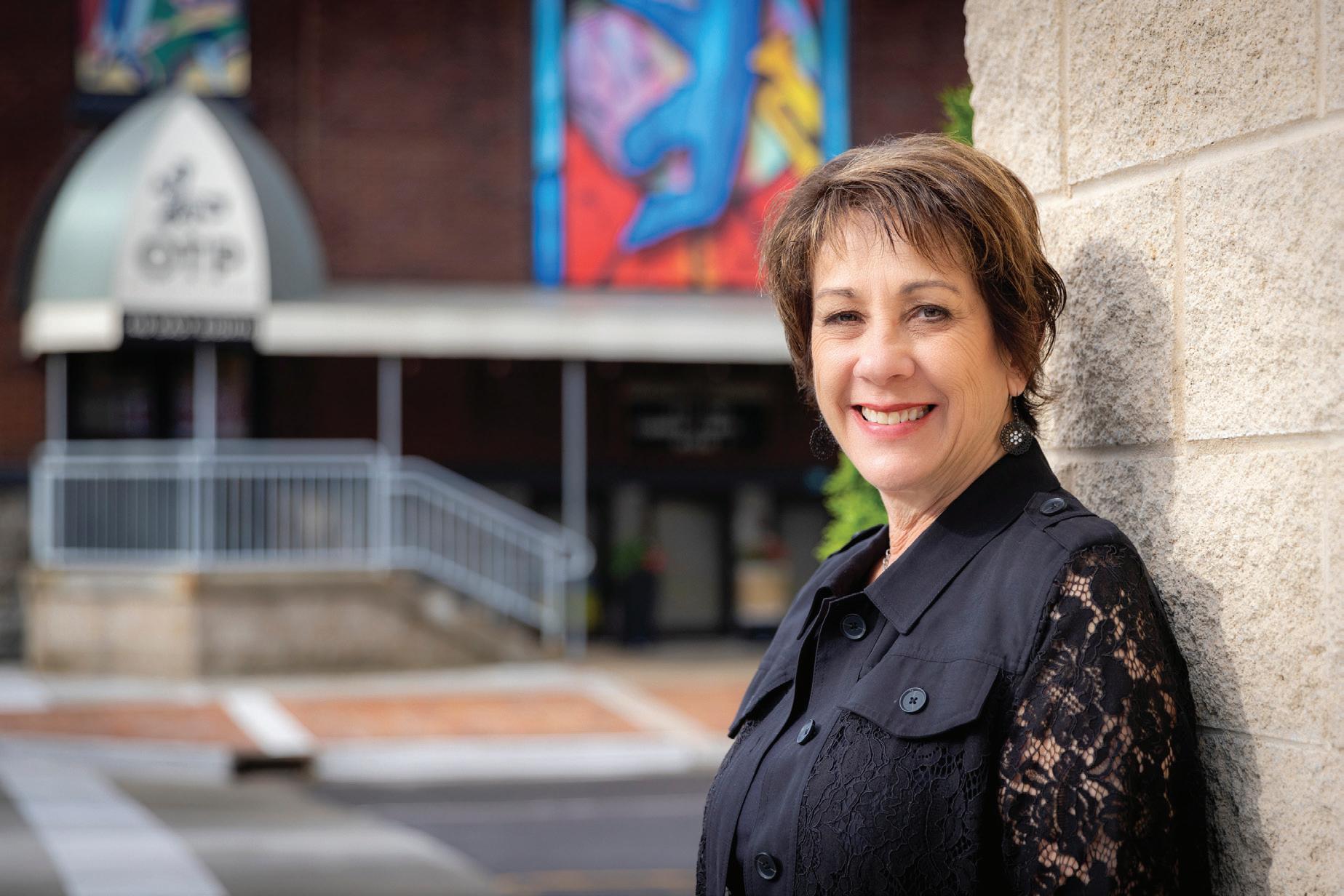



Isn’t it time you splurged on a fully loaded equestrian estate? This luxury six-acre gated estate is adjacent to Flintfields Horse Park, home to the famed and increasingly prestigious Traverse City Horse Shows. The property, known as Pinecone Farm, was completed in 2024 with “no expense spared.” Among the many features and amenities include a main barn with four-bedroom, three-and-a-half bathroom residence above, an auxiliary barn with four-bedroom, two-bath staff accommodation and loads of state-of-the art stall space and supporting infrastructure. There’s also a spacious viewing lounge overlooking the show ring with plenty of space for indoor and outdoor entertaining.
6424 Brackett Rd., Williamsburg
$12 million
MLS#: 192675

15722 Waters Edge, Traverse City (Old Mission)
You’ll never get tired of soaking in all the shades of blue from this newly built Old Mission Peninsula waterfront gem. Perched 80 feet above East Grand Traverse Bay, the home is part of the gated Peninsula Shores community and offers cathedral ceilings, an oversized steam shower, a second-floor mezzanine, large covered patio and fully loaded kitchen. It also comes with a dedicated boat slip in the development’s designated marina, free of wait lists, additional dues or hassle. A whole-home Generac generator provides peace of mind when the weather takes a turn.
$3.6 million

You don’t get a lot of chances to own on the river in Leland, and it’s extremely rare for a property with this much potential to hit the market. Promoted as a “prime redevelopment property,” the 6,875 square-foot building for years has housed the popular sandwich shop Trish’s Dishes. The L-shaped lot is well suited for residential redevelopment, and includes approximately 178 feet of frontage on S. Main St./M-22 and 50 feet of frontage on the river. Aside from the café, the building currently houses office space in the middle and a residential townhome on the river, which is currently being used as a short-term rental unit.

There are few buildings in Traverse City more iconic than the stately Hannah Lay building, which has graced the corner of Front and Union streets for 140 years. Developers Tom and Nick Darga have been working meticulously in recent years to develop the top floor of the building into seven truly luxury condos with a variety of high-end features, including bay side balconies and rooftop living spaces. The location, historic charm and amenities in this 2,200 square-foot condo can’t be beat.




By Art Bukowski
The Grand Traverse region has never been short on real estate agents and brokers.
Hundreds of them are out there buying and selling little slices of northern Michigan paradise one closing at a time, and each has a different story about how they got there and what drives their passion for the industry.
The TCBN connects with four local agents who have a tale to tell.
How many local agents have been shot, stabbed and tased over the course of their lives?
We’re guessing it’s a list of one: Kelly Price of Century 21 Northland in Traverse City. Kelly is a New York City (Queens, to be specific) native who began her career in Florida, first as an emergency dispatcher and then a police officer.
She served in many roles over the course of her police career, she says, including narcotics officer, crime scene investigator, detective, DARE officer and more. She has stories for days, of course, including driving around to crime scenes with her young kids in the car, busting the local mayor in a prostitute sting and catching a bullet while responding to a bank robbery.
“I didn’t even realize I was hit at first. Thank God it missed my spine and it actually hit me in the fat part of the ass,” she said. “I just kept going because the adrenaline was pumping.”
It was an enjoyable chapter of her career, she says, but it was incredibly demanding.
“You do your regular job for eight hours,
but then the beeper is going off during the other 16,” she said. “When you’re crime scene, when you’re vice, three out of four nights that thing is going off.”
After the better part of 20 years in that life, Price came to Traverse City, where her husband (also a Florida police officer) is from. After another career chapter as an event coordinator for local dining establishments, Price has been in real estate since 2021 and loves every minute.
She admits to having a by-the-book, matter-of-fact way of going about business that comes from her time in law enforcement.
“I’m able to be very forward and ask the questions that I need answers to. I just don’t fuddle around. I have a unique class of clients who want that,” she says. “I’m a strong advocate for my clients, and I think that loyalty is a big deal.”
Price, of course, expects straight talk in return.
“Don’t call me up and tell me you have a 720 credit score because I know you’ve got a 450 and it just ain’t gonna work,” she said. “We’re not going to look at houses with a 450 credit score.”

Aside from closing deals, Price runs safety classes for local and downstate brokerages. She’s trained hundreds of agents in matters of awareness and self-defense, she says, with most local agents having taken the class.
“When I became a realtor, I wanted to bring my police experience to the realtor world,” she said. “Listen, this is the only occupation besides a prostitute

The Cop: Kelly Price Century 21 Northland Traverse City
where you bring a gentleman into the bedroom that you’ve never met before. Safety is important.”
And while she was president of the Women’s Council of Realtors of Northern Michigan, she’s adamant that these safety classes are not just for women.
“Men are assaulted (too), they just never report it,” she said.
Greenleaf Trust is here to help design the future you envision. Our team is exclusively dedicated to providing the highest level of comprehensive wealth management services, trust administration, and retirement plan services. Client relationships begin at $2 million.



Many agents come to real estate after time spent in another job, but it’s not all that common for them to leave a successful white-collar career to do so.
Alex MacKenzie earned his bachelor’s and master’s degrees in accounting from Michigan State University before passing the CPA exam and beginning his career in private and public accounting in the metro Detroit area. He got married and returned home to Traverse City, where he worked for a local CPA firm for a few more years.
As an accountant he worked with plenty of clients with commercial real estate holdings, and he found that world fascinating. After speaking with a few friends in the business, he made the leap in 2021.
“I didn’t make any money for two years in real estate. It was scary, but it was one of those things where I didn’t want to look back in 10 years and regret it if I didn’t do it,” he said. “My wife was very supportive.”
His value proposition as an agent is that his background gives him a clear picture of all the aspects of a commercial property.
“I was able to ramp up in this business because of the referrals I got from other agents in the industry,” he said. “If somebody has a complicated commercial real estate project ... and they don’t feel comfortable doing it themselves, they’ll refer it to me, and I think they have the confidence in doing that partially because of my background.”
He feels his accounting background makes him especially equipped to handle the buying and selling of both businesses and physical real estate.
“Commercial real estate is a lot more complex than the residential side of things a lot of the time … and understanding the nuances involved with the businesses that are operating in these commercial properties is important,” he said. “There’s a lot of people in the real estate business that understand the property side of it, but when there’s a business involved, I’m able to look at financial statements and understand what’s going on.”
This expertise allows him to provide “all-inclusive” service that his clients appreciate, he says.
“Often time it’s more efficient for the client because they don’t have to go get a full-blown business evaluation, which can cost significantly more money,” he said.
Now a few years in, things are going well for MacKenzie. He did 10 times the business in 2024 that he did the year prior, he says, and he continues to build his reputation while also managing 150,000 square feet of real estate and serving some


Build a welcoming, ‘up north lodge’ community center for a new manufacured housing development.
Burdco interpreted and fulfilled my greater vision for this building amidst major challenges, including design constraints, budget limitations and product shortages. Burdco executed the plan smoothly. The client communications were excellent. The details and workmanship are impressive and set a positive tone for the entire development. ”

The proliferation of real estate “teams” means that many sales attributed to an agent may not have been made by the agent themselves. The $40 million in sales under “John Smith” may actually be the product of his work in addition to that of one or more agents who work under him.
Over in Frankfort, hometown native Kari King racked up more than $28 million in sales in 2024 all by herself, roughly doubling her sales from the year prior. Some of these sales were outside of the MLS used for this issue’s realtor rankings, which shows her at $23.4 million.
“It was a crazy year for me,” she said. “It really came out of nowhere.”
While there isn’t a group of agents working under a “Kari King Team,” she’s quick to give credit to a combination of people and factors that have contributed to her success.
“Everything starts with the brokerage and their support of agents. I use a transaction coordinator who I think probably saved my life last year,” King said. “She’s been such amazing support behind the scenes.”
King knows her genuine local roots have also allowed her to get an edge in the real estate world.
“Connection to the community is the basis of my entire business,” she said. “Being born and raised here, I think it makes it easier for me to have that connection. The

people I’m working with are the people I grew up with.”
Finally, she credits her immediate and extended family for supporting her work, which isn’t contained to a 9-5 schedule. Her parents and husband help her juggle a busy home life with a demanding professional schedule.
“I definitely couldn’t do it without them,” she said.
King was born and raised in Frankfort before moving out to Sun Valley, Idaho for eight years while she worked as a sales manager for a sporting goods company. After she started having children, the pull of home became too strong, and she returned to Frankfort.
Her father was a broker at Crystal Mountain for more than 30 years, and her sister is a real estate agent in Grand Rapids. So, she decided to try her hand in the business.
“It ran in the family, plus I had a lot of sales background with my past career, so it was a natural fit,” she said.
About a decade on and she’s firing on all cylinders. And while strong sales numbers are always nice, she derives the most joy from continuing to serve her community.
“To be able to help some local families that I know really well find homes and be




Rebecca Brown is a Traverse City native who went to Central Michigan University for marketing and public relations. She started started pinching her pennies immediately upon landing a job at a local marketing agency.
“When I graduated college and got my first big girl job, I took saving really seriously,” she said. “I knew I wanted to get a home young – I didn’t want to rent or anything like that.”
She bought her first home at 23. She didn’t have the best experience with real estate agents during this process, and it was then that she first thought about the value she could provide to clients, especially young ones like herself.
“I had to do a lot of work on my own, but I loved being able to answer all of these questions because I had done the research,” she said. “What really sparked my interest was the need for a young real estate agent who really understands what young home buyers need. I didn’t feel like there was anybody like me out there in real estate.”
After being moved into sales at her marketing job and becoming disillusioned with that world, she connected with old boss and prolific Traverse City businessman Troy Daily, who (among many, many other ventures) is also a real estate agent with The Mitten Group.
Daily brought her on to handle social media and marketing for his businesses while she trained to be a real estate agent. That appealed to Brown as it allowed her to be selective about her real estate endeavors.

Marketing is also something Brown truly enjoys, so she wasn’t ready to give it up entirely.
“I feel like it’s something I’m naturally really good at,” she said. “I’m just chronically online.”
She’s also using marketing (videos on social media, in particular) to build her own personal brand and business.
“If you ask any top producer right now, I guarantee that cold calling is a major part of their business. And I have so much respect for it, but that’s not something that I want to do or that I’m good at,” she said. “So for me it was: How can I use social media? How can I put my personality out there? If I can use this tool and this resource and connect with a younger audience and get business from it, then that’s awesome.”
So far, it’s working. She’s closing deals, and the focus has been where she always wanted it to be.
“I think I’ve done maybe just under $3 million in volume, and 100% of my closed buyers from my first year on the buy side were all first-time home buyers … who were all primarily young,” she said. “That’s very important to me.”
Like all young agents, Brown is still learning. The key, she says, is to recognize that fact and embrace it. Giving yourself the time (and patience) to learn and grow will help build a much stronger and successful agent in the long-term, she says.
“When you first start, they talk a lot about how you have to have confidence. But how am I going to have confidence when I literally just started this? I didn’t have a transaction for the first four months,” she said. “So I looked at: How am I presenting myself? How am I walking into a room? How am I shaking somebody’s hand? What is my answer when I don’t know the answer? That’s a big one.” The
“It puts me in a position where I’m not desperate to sell. I never want me keeping my lights on and food in my belly dependent on somebody needing to buy a home,” she said. “I don’t want them to ever feel like I’m pushing them into buying a home because I need a sale.”
Remember the 80’s?
Lori’s hair is smaller, and so are her interest rates




By Eric Braund, columnist
Investing in real estate has long been a reliable way to build wealth and can effectively diversify your overall investment portfolio. Based on our experience, buying or selling real estate necessitates a thorough analysis of various financial aspects, including financing options, cash flow analysis, tax considerations and how these decisions align with your overall financial planning goals.
Many of our clients with real estate investments typically fall into one of two categories:
1. Planning to buy. They own a primary residence and are planning to purchase an additional property in a warmer climate, such as Florida or Arizona.
2. Planning to simplify. They own multiple residences or investment properties and have decided to simplify their lives by downsizing, reducing the burden of managing several properties.
When thinking about acquiring a second home for retirement or as a rental investment property, it is essential to assess how this second home will affect your annual lifestyle budget and the overall costs associated with investment real estate.
Some aspects to consider:
• Financing: Options include refinancing the primary mortgage, opening a home equity line of credit, outright purchase or a conventional mortgage. Consider the cash flows involved and how self-funding or loan payments might affect the overall financial situation.
• Interest rates: Interest rates and the terms of financing are critical factors in analyzing the viability of the purchase. Even half a point on the interest rate may be the difference as to whether a property is affordable or if the rental will be “cash-flow positive.”
• HOA, insurance, taxes, and other expenses: Many second and retirement homes are purchased in exclusive communities where the burden of property maintenance is outsourced. These conveniences come at a cost and fees tend to rise each year. Insurance in warmer climates

and coastlines is expensive and property tax assessments have risen substantially.
Between 2019-2023, insurance coverage in Florida has risen 60% and some insurers have canceled coverage altogether.[1] There may also be travel costs or property management expenses.
• Legal titling: Consider alternative titling for the additional property, such as a revocable trust to avoid dual-state probate issues or holding rental property in an LLC to avoid personal liability risks. These are important legal questions best answered by a qualified attorney.
For those looking to downsize or simplify their lives, it is essential to carefully analyze the tax implications involved. Strategies to minimize taxes, as well as considerations for special tax issues and other selling costs, should be discussed well in advance of the sales process. Depending on future objectives and in collaboration with your financial and tax advisor, it may be possible to defer or even eliminate taxes entirely.
Strategies may include: • Strategic use of the residency exclu-
sion: If you’ve declared the property as your residence for any two of the previous five years, you (and your spouse) may exclude up to $250,000 each in capital gains from taxation. The rules are specific, but with careful documentation and planning, the tax savings could be substantial.
• Depreciation and other deductions: With rental real estate, annual depreciation deductions taken are brought back in the final tax calculations for the sale of the property. Figuring these into the sales analysis is critical to avoid surprises. Past improvements to the property may raise the cost basis (and lower capital gains), so keep records of these expenses.
• Utilizing a Section 1031 Exchange Election: Simultaneously selling and buying similar-type investment property may defer capital gains taxes on the sold property using this tax strategy. 1031 rules are strict, so it’s critical to work with your advisor, tax professional, and a “1031 specialist” to coordinate the sale and purchase and to maintain compliance with the criteria.
While the financial and legal aspects of real estate should be a priority, it’s also important to consider other factors that can
impact your potential investment. These factors include location attributes, property type and your overall game plan and exit strategy. These are crucial criteria to keep in mind when making your decision.
Navigating the complexities of real estate investing, especially when trying to align it with your overall financial strategy, can be overwhelming. A wise first step is to seek professional guidance from a fee-only Certified Financial Planner® and a tax advisor. They can help you determine which strategies will be most beneficial for your individual situation and goals.
Eric Braund, CFP®, CRPC® is the founder and CFO at Black Walnut Wealth Management, a fee-only financial advisory firm providing counsel and fiduciary financial services to individuals, families and private foundations throughout the Traverse City and northern Michigan region. Contact him at (231)421-7711 or visit BlackWalnutWM. com. Braund is an investment advisor representative with Dynamic Wealth Advisors, dba Black Walnut Wealth Management. All investment advisory services are offered through Dynamic Wealth Advisors.









By Art Bukowski
If you haven’t already heard terms like “direct primary care” and “concierge medicine,” you will soon enough.
While there is considerable variation and overlap with how these terms are used, both generally involve making direct payments to a healthcare provider outside of the traditional insurance system.
Direct primary care (DPC) practices often operate on a flat monthly or annual membership fee that covers most primary care services with no insurance billing at all. Concierge medicine practices often combine a membership fee of some sort for certain services while continuing to bill insurance for additional services.
Practitioners that adopt these models, particularly DPC, tout patient benefits that include cost savings, improved access to care, enhanced doctor-patient
Table Health
Location: Traverse City and Petoskey
Founded: 2018
Employees: 12 between two offices
Patients: 991 DPC (3,250 total for all services)
Describe your services. Table Health offers direct primary care (DPC) in Traverse City and Petoskey for individuals and businesses featuring an affordable monthly fee for comprehensive primary care. This includes same-day, next-day, and after hours care from your doctor, discounts on labs and common medications, with the elimination of insurance billing and surprise costs. Beyond DPC, Table Health provides functional medicine, wellness services (bodywork, nutrition), and mental health. Practitioner-led workshops and events are also available.
How do people pay for your services?
Almost all services are membership based, with a one-time enrollment fee followed by a monthly fee, which most people choose to have automatically charged to their credit card for ease and convenience. That’s it. No insurance billing or balance billing. No explanation of benefits form. No copay. No deductible. Not billing insurance allows us to keep our operations streamlined, fees reasonable, and everyone less focused on billing and more focused on the patient. Everyone is happier in this model.
Pricing structure: For DPC, $100 one time enrollment fee followed by a $57 or $99 per month payment depending on age and type of membership.
What is special or unique about your office or the way it does business?
Table Health distinguishes itself among
relationships and a focus on preventative care. Providers love not dealing with insurance paperwork or claims and often have much lower administrative burden. Many speak of having more time to focus on patients instead of bureaucracy.
Both DPC and concierge medicine are experiencing significant growth nationwide, with hundreds of practices coming online in recent years.
Pure DPC practice Table Health was the pioneer of this method in the Traverse City area. Since Table Health opened its doors in 2018, several other DPC or concierge outfits have arrived. Some are fully local while others are local offices of larger groups. In addition, at least one established local office has providers moving to a concierge model.
What follows is a roundup of some local DPC/concierge practices, with their operations described in their own words. Please note that this should not be considered a complete list – a few practices that classify themselves in this way did not respond to TCBN’s inquiries.

DPC practices through three core elements. First, it operates as a mission-driven business, prioritizing community impact over profit. This commitment shapes all decisions, fostering a palpable sense of purpose for staff, patients, and employer clients. Second, Table Health offers a comprehensive suite of primary and
preventative services within one location, enabling a collaborative and convenient healthcare experience. Finally, its unique company culture, symbolized by its name, emphasizes equality and respect. This “horizontal” approach empowers both staff and patients, creating an inclusive and valued environment.




Stowe Farm Pediatrics
Location: Suttons Bay
Founded: 2023
Employees: 1 full-time, 3 part-time
Patients: About 200
Describe your services: I am a board-certified pediatrician offering full-spectrum primary care pediatrics in a warm, caring, and personalized setting. I describe it as practicing modern pediatrics in an old-fashioned way. Families pay a monthly membership fee for services, and in turn receive an unparalleled level of access and direct communication to me and to my nurse practitioners. Our appointments are longer and unhurried, it’s easy to schedule an urgent visit quickly, and we offer home visits as well. We strive to provide thoughtful, comprehensive, evidence-based care for newborns through young adults, with the patient and family at the center, and with a focus on relationships, trust, and continuity. How do people pay for your services? Families pay a monthly membership fee in exchange for our primary care services. We do not bill insurance for our services, which allows us to maintain a small patient panel where we know every family well, to provide quick and direct communication with families, to offer longer/ less rushed appointments, to offer home visits, and more. Families are still able to utilize their insurance for other aspects of healthcare when needed: for prescription coverage, for specialist visits, for labs and
Dr. Phoebe Danziger

imaging when needed. We partner with a company called Vaxcare to provide immunizations in the office, and Vaxcare is able to bill these through families’ insurance. Pricing structure: We have a tiered pricing structure. For one child, membership is $150/month for infants from 0 to 12 months, $125/month for children ages 1-5, and $95/month for children 5 and older. There are more routine well child visits and often more frequent needs in the younger age groups, so the pricing accounts for this. For families with multi-
ple children, there is a family maximum of $300 per month. Families sometimes find that with such a high level of primary care, DPC membership often ends up being less expensive than care provided elsewhere because of how frequently we are able to avoid expensive urgent care or ER visits and co-pays, unnecessary specialist referrals, and more. What is special or unique about your office or the way it does business? Practicing in a direct primary care model allows us to offer an environment that feels like
an intimate, old-fashioned medical practice. Our appointments are more relaxed and unrushed, we have a clean, fun, and comfortable space for kids to play, and we offer communication through a secure texting app which allows easy ongoing communication with families as needed. We are able to offer fun community events like children’s yoga classes and our annual “Farm Animals and Flu Shots” event where families can come for seasonal vaccines and visit with some sweet animals like goats and mini horses!





hemming& Wealth Management truly believes in financial planning for life-long fulfillment. Whether you’re dreaming of a forever home, new car, your retirement lifestyle, or a lasting legacy, we’ll help you make purposeful decisions and ensure your financial plan is well-coordinated and effective in reaching your goals.
Life looks good on you.

Location: Services provided in-home across 10 northern Michigan counties
Founded: 2023
Employees: 4
Patients: 100
Describe your services: Waterfront Wellness Primary Care transcends traditional titles, blending aspects of both DPC and concierge models. While we do not accept insurance, our practice emphasizes the convenience and direct access characteristic of affordable concierge care. We provide straightforward, old-fashioned unlimited access to healthcare at an affordable price; no office staff or middlemen involved. Recognizing the value of your time, we offer personalized in-home medical visits tailored to your specific needs, eliminating travel hassles. Our board-certified practitioners are committed to delivering high-quality care with convenience, privacy, and affordability in mind. Additionally, we accommodate one-time visits for you and your loved ones, making our services accessible to both seasonal and permanent residents.
How do people pay for your services?
We offer flexible membership Primary Care contracts of 3, 6, or 12 months,

with the option to cancel anytime with 30 days’ notice. For those seeking simple one-time services for themselves or area visitors, we provide an introductory visit at $150, ensuring no copays or hidden fees. Additionally, we accept HSA/FSA payments but we do not bill insurance.




Pricing structure: $200 per month. What is special or unique about your office or the way it does business?
Waterfront Wellness Primary Care is a locally-owned practice that provides unique at-home medical visits, offering a fresh and personalized approach to healthcare. Patients can easily schedule



timely visits and directly contact their board-certified practitioners via cell, email, or tele-health. Our services include in-home lab work, along with the convenience of portable x-rays and other necessary in-home diagnostics, all designed to enhance your healthcare experience.




















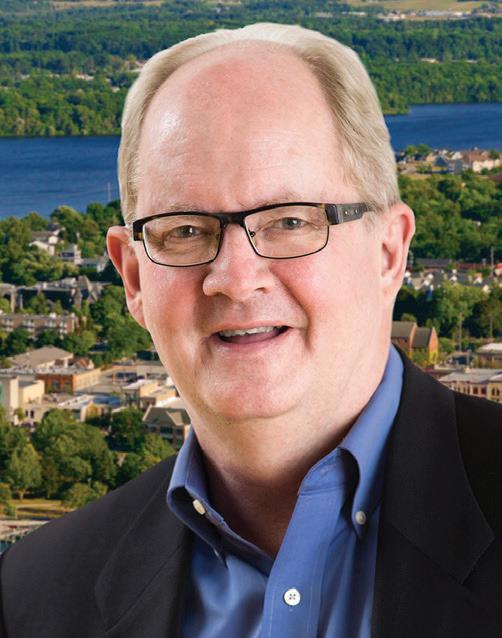


Molly Buttleman
Camille Campbell
The Shawn Schmidt Group
International President’s Circle
Kevin Perkins
Bob & Tia Rieck Team
Dean Templeton International
Bart Ford
Mark Hagan Real Estate
Katie Hanson
Pam Klumpp
Sue Louiselle
Adam Miller
Vera Owen
Shannon
Judy Robinson
Karen Schmidt
Milda Stapleton
The Bill Stireman Team
The Street Team
Leslie Young

Location: Grand Rapids, with Traverse City office opening in a few months
Founded: 2024
Employees: 17 total, 6 in TC
Patients: 5,000; expect an additional 2,000 in Traverse City
Describe your services: MIPH features a team-based care model, which means we utilize experienced physicians and other providers, including physician assistants, nurse practitioners, nurses, medical assistants and health coaches, all of whom are supported by physicians who are board-certified in pediatrics, internal medicine and family medicine with expertise in caring for children, older adults and substance use disorders. Patients enjoy an increased ability to connect with our primary care team with benefits such as same day or next day appointments, longer appointments and closer relationships with their provider. Our model includes in-person and telemedicine visits, phone consultation and secure messaging. MIPH focuses on prevention and wellness, along with diagnosis and treatment of common chronic diseases and acute illnesses.
How do people pay for your services? Individuals/families pay a monthly membership fee that includes unlimited primary care encounters (in-person visits, virtual visits, secure texts, phone calls) and in-office procedures. Employers contract with MIPH for primary care services for their employees and dependents. Employers offer on-site primary care services, shared near site locations or direct their employees to an MIPH office. We don’t bill insurance for primary care services, but coordinate with each individual’s health plan to make sure they get the best value for their insurance. Insurance is still needed for labs, imaging, specialty visits, and hospital care.
Pricing structure: Individual memberships range from $60 to $160 per month and family memberships are capped at $300 per month. Employer pricing is variable depending on the site of care, number of employees enrolled and services provided. On a per employee per month formula, it ranges from $45$60/month. This is generally paid for entirely by employers. What is special or unique about your office or the way it does business? MIPH provides customized company-wide employer healthcare to employers to help improve wellness, lower healthcare costs, and support recruitment and retention efforts through easily accessible primary care services. While it will always be important to us to offer plans for individual patients outside of employer plans, the vast majority of our current patients are enrolled through employers. We have a multifaceted leadership team with industry insights, high patient satisfaction and care delivery that lowers the use of urgent care and emergency department visits. We navigate complex health systems at a lower cost and are connected with a broad specialty physician network. MIPH provides premier primary care services and manages most conditions without having to leave our care.

Location: Traverse City
Founded: 2024
Employees: 6
Patients: 200
Describe your services: We are a comprehensive primary care practice providing personalized healthcare for patients ages 14 and older. Our services include preventive care, annual physicals, and the management of chronic conditions such as diabetes, hypertension, thyroid disorders, and gastrointestinal issues. In addition to general primary care, we specialize in hormone optimization for both men and women, addressing issues such as hormonal imbalances, low testosterone, and perimenopause/menopause. Our weight management programs are tailored to each individual, focusing on sustainable, results-driven strategies that support overall health and wellness. We emphasize patient education, lifestyle modification, and evidence-based treatments to help our patients achieve their long-term health goals. Our approach combines compassionate care with clinical expertise to ensure every patient receives the attention and support they deserve.
How do people pay for your services? We offer flexible payment options to accommodate a variety of patient needs. We accept most major insurance plans and also provide a monthly membership plan for those seeking ongoing care without traditional insurance. Additionally, we offer an exclusive concierge service for a limited number of patients, providing highly personalized care and enhanced access to our providers. Our goal is to make quality healthcare accessible, convenient, and tailored to each individual’s preferences.
Pricing structure: Along with most insurance plans we offer direct primary care at $75 per month after an $100 enrollment fee. Our employer program is $50 per employee (minimum of 5) after a $50 enrollment fee per person.
What is special or unique about your office or the way it does business? What sets our practice apart is the intentional and thoughtful selection of our care team. Each provider was hand-picked not only for their clinical expertise, but also for their deep commitment to patient-centered care. Our team brings specialized knowledge in key areas such as gut health, weight management, female hormone balance, primary care, and chronic disease management. This allows us to offer comprehensive, personalized treatment plans tailored to each patient’s unique health journey. We prioritize quality over volume, ensuring our patients receive attentive, compassionate, and evidence-based care. By fostering strong patient-provider relationships and staying current with the latest medical advancements, we create an environment where people feel heard, supported, and empowered in their wellness goals.












Location: Traverse City
Founded: 2004
Employees: 10
Patients: 3,500 (about 750 and growing enrolled in MDVIP, a concierge service)
Describe your services: As MDVIP affiliates, we maintain smaller practices, which allows us to spend more time with each patient to focus on disease prevention and early detection, as well as help manage chronic conditions. We schedule same- or next-day appointments that last an average of 30 minutes and our patients can reach us 24/7. The cornerstone of our services is the Annual Wellness Program, which encompasses advanced screenings and diagnostic tests that focuses on important health and wellness areas including heart health, emotional well-being, diabetes risk, respiratory health, quality of sleep, hearing and vision, sexual health, nutritional assessment, weight management, bone health, risk factor analysis. Using the results we work with patients to create a personalized wellness plan and provide ongoing physician coaching to help them make lifestyle changes to achieve their health goals.
How do people pay for your services?
The annual MDVIP membership fee pays for preventive care medical services, notably the Annual Wellness Program, which insurance does not typically cover. We bill insurance and collect copays/

deductibles as is customary for other medical services like sick visits. The MDVIP program is compatible with most health savings accounts. Patients outside of the MDVIP program use insurance.
Pricing structure: The annual membership fee is $2,100 and can be paid annually, semi-annually or quarterly. What is special or unique about your office or the way it does business?
The current healthcare system is pushing providers toward a “make it quick” medicine model, forcing them to hurry patients in and out the door to stay afloat. At Bay Area Family Care, with help from MDVIP, we offer another option to our patients. With longer visit times, we are able to connect with our patients on another level. We use this extra time to learn more about our
patient’s healthcare needs, lifestyle goals and obstacles. We are able to craft a customized plan for the individual, work to overcome insurance push-back and help achieve their goals. Our providers are wonderful listeners and have a tremendous capacity for empathy. Our support staff is genuinely invested in the health of our patients. Together, our family care team is like no other.

Four months in, northern Michigan’s new mental health crisis center is thriving

By Craig Manning
“A soft opening.”
That’s how Munson Healthcare officials describe the first few months at the new Grand Traverse Mental Health Crisis and Access Center.
After years of planning and buildout – not to mention big funding allocations from the American Rescue Plan Act (ARPA) and from the Michigan Health & Hospital Association (MHA) – Traverse City’s new mental health crisis center finally opened its doors on January 5. Come July, the facility will transition out of its “soft opening” era and into full 24/7 operations.
Ahead of that big milestone, the TCBN sat down with the core leadership of the crisis center to get an update on patient volumes, timeline for new services and more.
The new center is a partnership between Munson Healthcare and Northern Lakes Community Mental Health Authority, two entities that have been looking to expand northern Michigan’s continuum of mental health care services for years.
“The best practice in a community crisis continuum is that everybody knows a place to call, so a crisis hotline; a place to go, so a crisis center; and someone to come to you, which is a mobile crisis
unit,” explained Terri Lacroix-Kelty, executive director of behavioral health for Munson Healthcare. “When you have those pieces in place, then you have a really good crisis continuum – a system where, if people are getting into crisis, you’re intervening early.”
According to Lacroix-Kelty, northern Michigan has had the crisis hotline and mobile crisis unit parts of that equation
opening “a long time coming,” and praises the project as proof “that patience and persistence pays off.”
“We’re really grateful, because without that support from the ARPA funding and then the MHA grant, we wouldn’t be as far along as we are. You really do need that money piece squared away to get things started,” Lacroix-Kelty said.
The ARPA money for the center was
“We’re hoping people come before crisis. So, if parents are realizing, ‘Wow, my child seems to be struggling; I don’t know what to do,’ we want them come to us with those access and support questions sooner rather than later.”
– Terri Lacroix-Kelty, Executive Director of Behavioral Health, Munson Healthcare
covered for years, thanks to Northern Lakes. Until now, the Grand Traverse region did not have a crisis center dedicated specifically to mental health services.
That changed this past January, when Munson and Northern Lakes opened the Grand Traverse Mental Health Crisis and Access Center in a 22,000-square-foot building on the Munson Medical Center campus. Lacroix-Kelty calls the center’s
allocated all the way back in December 2022, when, during their final meeting of that year, Grand Traverse County commissioners apportioned out the county’s $18.1 million in ARPA funding to 30 local recipients. The single largest of those allocations was a $5 million earmark for mental health services and infrastructure in Grand Traverse County – money that led eventually to the new center.
In September 2023, Munson landed an additional $5 million in funding from the MHA, for “adding much-needed pediatric mental health and crisis services in northern Michigan.” That grant came from a larger $50 million appropriation in the 2023 state budget, aimed at improving access to youth behavioral health services throughout Michigan.
Right now, the crisis center is operating Sundays through Thursdays from 8am to 8pm. Munson Healthcare COO Laura Glenn says the idea was to treat the first few months “as kind of a soft opening,” with opportunities to introduce the new center to the community and for the staff to navigate the learning curve before expanding to round-the-clock service. That pivot to 24/7 operations is intended to take place in July – as is the opening of a “psychiatric urgent care” component, which will serve both adults and children.
“Those are really the next big milestones for us,” Glenn said.
During its first phase, the center has been offering a Northern Lakes-operated welcome center, with services including behavioral health assessments, referrals to higher levels of care, crisis phone screening, mobile crisis services and peer support services.
With the second phase kicking off in
July, the center will add not just 24/7 operations, but also the aforementioned psychiatric urgent care, which will be operated by Munson staff. Northern Lakes, meanwhile, will continue to focus on the center’s current more relaxed approach, which Michael Corby, behavioral health director for the center, describes as a “living room model” of mental health care.
“We’ve got a combination of social workers and peer support specialists in the building, and we have this big, beautiful new space where we’re able to de-escalate patients and help them figure out what the next steps are for them,” Corby said of the living room model, noting that the center was specifically designed to be a more comfortable and relaxing environment than the typical hospital setting. “A lot of the time, what we’re seeing is individuals brought in by a support – so either a family member or a concerned boyfriend, girlfriend, or roommate – and typically it’s folks who are experiencing a crisis and they just don’t know what to do next.”
Patients in need of de-escalation are welcome to stay at the center “until they’re in a better frame of mind.” That de-escalation aspect has been the core selling point of the center’s first phase, though Corby stresses the facility’s professionals have also been able to help patients and their families make game plans for the future.
“Sometimes that’s plugging the patient into resources and appointments for

outpatient care,” Corby explained. “Sometimes that’s doing a hospital screening assessment, and we have admitted some people to the hospital. But we’re also finding that this center is a great resource to be able to talk with folks who are thinking they want to go inpatient, because maybe that’s what they’ve done in the past. But after talking with them for a while, we’re able to de-escalate, create a safety plan for them to go home, and provide resources.”
Because Traverse City hasn’t had a

crisis center of this ilk before, Glenn and Corby say one of the big priorities of the first few months has been to rewire the thinking around mental health in the community. Historically, Glenn says patients experiencing mental health crises in the Traverse City area have taken those concerns to the emergency department at Munson Medical Center (MMC) – a costlier and less well-suited course of action.
“Part of what we were trying to accomplish with the center was to have it be lo-
cated close to the emergency department,” Glenn said, noting that the proximity will make it easy for ED staff to refer patients experiencing mental health crises to a facility better-equipped to meet their needs.
Lacroix-Kelty echoes Glenn’s point, explaining that having a recognized “hub” for mental health services in the community will make a big difference.
“The center will be the known place to go when people need information or treatment around mental health,” Lacroix-Kel-


ty said. “We’re hoping people come before crisis. So, if parents are realizing, ‘Wow, my child seems to be struggling; I don’t know what to do,’ we want them come to us with those access and support questions sooner rather than later.”
Based on patient numbers, Corby is confident the community is becoming more aware of the center and more used to accessing its services. Across the first three months of operations, the center tallied 155 “contacts,” or patients who came through the door seeking care. In January, just 40 people visited; by March, the monthly visitor count had roughly doubled.
“Part of that increase is probably just seasonality, but I think a far bigger part is people becoming more comfortable at the center,” Corby said. “It’s proof that we’re getting the word out.”
Corby expects the center will continue to see more patients as summer rolls in, especially with the shift to 24/7 service in July. Another bump will come later, when Munson and Northern Lakes open phases three and four of the center’s evolution: a nine-bed adult crisis residential unit and a six-bed pediatric crisis residential unit, respectively.
Both of those residential units will be situated inside the 22,000 square-foot footprint of the center. The adult unit is already built out and is “just working through the licensing and staffing,” per
Glenn. That unit, which will be operated by Northern Lakes, is likely to open sometime this year. The pediatric unit, meanwhile – which Munson will lead – is still awaiting a buildout.
“Youth crisis residential is a relatively new kind of model, and the licensing requirements are a bit complex,” Glenn said. “We’ve been in the design process on that unit, and we have blueprints in with the state for their review. We’re excited to begin construction, hopefully this summer or early fall. But we don’t have an exact date on which that will open, just because we’re still working through the design and build process.”
Once those residential components open, Glenn is confident the center will become an even more valuable tool for reducing strain on other aspects of Munson’s operations.
“A component of the population that we will serve in these crisis residential units are people that have historically ended up in our emergency departments, and have ended up staying there for prolonged periods of time because they’re not safe to go home,” Glenn explained. “A lot of those people will be able to receive care in these crisis residential units, which honestly is a way more appropriate place for them to receive care than in an emergency department.”
MMC does have a small inpatient psychiatric unit already, but Glenn says that part of the hospital is “frequently at
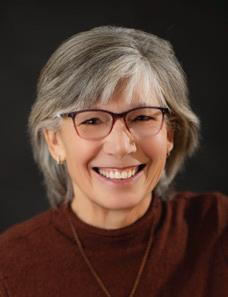





capacity,” with plenty of opportunities to relocate patients into a “less acute environment” of care.
Crisis residential units, Corby says, will provide that “step-down” in care, in that they will still offer a “24/7 monitored environment,” but without the intensive, “locked door” approach of an inpatient wing at the hospital.
Right now, northern Michigan’s closest crisis residential units are in Gaylord and
Oscoda, making them less than ideal for Traverse City patients. Having those types of units right at the center of the Munson system has been on the wish list for quite some time.
“With this center, we’re building out the continuum of care for behavioral health in Traverse City, and these crisis residential units are a key part of the continuum that we’re just missing today,” Glenn said.


By Rebecca Teahen, columnist
What do you think of when you hear the term “financial health?”
Maybe to you, financial health means balancing your checkbook every month. Maybe you track your spending on a new app – if it’s green, you’re good.
Maybe your ideal vision of financial health exists in the future, when you’ve reached your target retirement date and you’re ready to sail off into the sunset.
No matter how you define it, financial health and wellness plays a crucial role in your overall health and wellness. These two facets combine to create what can be either a rewarding retirement or constant struggles leading to much less desirable outcomes.
Research shows a direct correlation between higher incomes and improved health outcomes.* Conversely, lower incomes can lead to higher rates of chronic disease and even shorter life expectancy.
The same research review shows that the emotional strain of financial challenges can cause higher rates of stress and anxiety leading to other physiological issues and may cause individuals to delay getting needed healthcare. This unfortunate cycle is sometimes described as “financial cancer.”
By keeping your mind, body and your finances healthy, you’ll be able to enjoy your full “health span” – your healthy, active lifespan.
First, it’s important to consider that, just like your physical health, it is very appropriate to ask for help and coaching regarding your financial fitness!
Whether you’re going it alone, or preparing to work with an advisor, the two key factors will be income and expenses. If you are spending more than you’re earning, you either need to cut back on expenses or find a way to increase your income. I know, I know, easier said than done! Here are a few key considerations to get started:
• Can you trim anything from discretionary spending or find other ways to save?
• Can you ask for a raise, work additional hours or upskill for a new role?
• If you’re retired and living off invest-

ment income, review the numbers to ensure you’re spending at a sustainable rate.
Keeping this equation in balance really is the key to financial health. It doesn’t matter if you have $100 or $10,000,000 in the bank, it still has to be in balance.
Once you have space in your budget to accommodate your basic needs, it’s time to start saving. Many people find it helpful to establish “buckets” for different spending/saving purposes. It’s always a good idea to have a dedicated savings account for emergencies as a first step. Once you have these basics covered, you may be well on your way to enjoying a sense of financial health and wellness.
As your savings grow, you’ll be able to allocate funds toward broader goals as part of your financial plan. These may include retirement savings, education funding, charitable giving, and more. If you have a high-deductible health insurance plan, a health savings account is a great tool to use for current and future health care needs.
While higher income earners may have better access to healthcare and better health outcomes, it doesn’t mean they’re immune to challenges and stresses.
Any financial planning process should include health and wellness planning. A recent study conducted by Greenwald & Associates on behalf of MassMutual found that, compared to the amount of retirement assets, “health actually appears to be the more important driver of well-being in retirement.”
This includes not only your health, but the health of your loved ones as well. From lifestyle choices to family dynamics, these can be complicated issues that may require careful planning and expert advice.
• Are you or will you be caring for aging parents?
• Are you and your spouse/partner working to maintain your health so that you can enjoy the retirement you had envisioned earlier in life?
• Do you have a child with health concerns?
• Are your children prepared to navigate the future as your health-span fades?
cial
It’s important to start with open communication. That means talking through these issues with your family and then meeting with your advisor(s).
As part of your work on these items,
make sure that you have all of your important documents updated, organized and stored in a place where key family members can find them! If you don’t have a team you can rely on, perhaps part of your financial health check-up should be interviewing advisors to find a better fit – someone your family can be comfortable and confident working with for the long term.
It’s a Marathon, Not a Sprint
Our financial wellness directly impacts our physical health, and our physical health is crucial to enjoying the long, healthy lives we are planning for as we build our financial foundation. The two are inextricably linked and I’m here cheering you on as you invest in both!
Rebecca Teahen, CIMA® is a financial advisor and fitness enthusiast with Baird Incorporated, located in Traverse City and serving clients nationwide. Send a note to rteahen@ rwbaird.com to get in touch. The information offered is provided to you for informational purposes only. Robert W. Baird & Co. Incorporated is not a legal or tax services provider and you are strongly encouraged to seek the advice of the appropriate professional advisors before taking any action.


Gameday Men’s Health brings a new brand, approach to male health and wellness to
By Craig Manning
Meet Traverse City’s newest franchise. Late last year, downstate entrepreneur Justin Grinnell opened a Gameday Men’s Health clinic in the Copper Ridge complex. The business, which offers services like testosterone replacement therapy (TRT), vitamin injections, weight loss therapy, and treatments for common men’s issues like hair loss and erectile dysfunction, Gameday now calls itself the lone men’s-only clinic in the northern Michigan region.
According to Grinnell, Gameday Men’s Health is the fastest-growing health and fitness franchise in the United States right now, “rivaling the pace that Orangetheory did back from 2016 to 2018.” The difference, at least as it pertains to northern Michigan, is that Orangetheory – which focuses on strength and cardio fitness classes – has never made it to Traverse City, even with more than 1,300 other locations now operating in the U.S. When he decided to hop on the Gameday Men’s Health train, Grinnell knew right away that he wanted to bring the business to TC.
A graduate of Michigan State University with a degree in kinesiology, Grinnell has been a personal trainer for 23 years.
For the past 15, he and his wife have been operating State of Fitness, a personal training gym they own in Lansing. The couple will continue living in Lansing and running State of Fitness, but decided a few years ago that they wanted to branch out both in terms of business model and geography.
“My wife and I had opportunities from other franchises to open up other fitness stuff, but we said to each other, ‘We’ve
his part of the state, the appeal of opening a clinic in northern Michigan ultimately trumped all other options.
“My parents have had a place up here for about seven years, on East Bay, and it’s just an amazing area,” Grinnell said. “We did our research, and it looked like a great market [for the business]. And fortunately, the franchise liked it too.”
Grinnell’s Traverse City Gameday clinic
“The goal really is to make people feel welcome, so that they can show a little more vulnerability with some of the issues that may be a little bit embarrassing for them. That’s maybe our biggest differentiator.”
– Justin Grinnell, Owner, Gameday Men’s Health
done a lot in this business; we want to do something else,’” Grinnell said. “My wife was in the medical and pharma world for a number of years, and I’ve always been interested in that more holistic health side, too. That led us to the Gameday Men’s Health franchise.”
While Grinnell says he did look at business prospects and demographics in
officially opened its doors in December 2024. Now, the business is working to build name-brand recognition and word-of-mouth among northern Michiganders who might not be familiar with the franchise.
While Grinnell says the founders of Gameday “really want it to be a household name,” the business currently has only five other franchise locations in Michigan,
and none of them are north of the Grand Rapids area. That lack of northern Michigan presence meant Grinnell and his team had some legwork to do to launch the business into a brand-new market.
“Mostly, we’ve been trying to do grassroots stuff,” Grinnell said of his marketing strategy. “We’ve been working to connect with gyms, connect with physicians, connect with urology specialists in the area. Clinically, we’ve partnered with a sleep study place in our building. And as the summer comes, we want to do more event-driven stuff, whether it’s hosting golf outings or sponsoring a local 5K.”
If there’s a challenge to building a local following, Grinnell says it has mostly come down to stigma. Some of the conditions that Gameday seeks to treat, like low testosterone or erectile dysfunction, are things that men have traditionally been nervous or embarrassed to seek help for. In fact, Grinnell says it was precisely that stigma that led to the origin of the Gameday brand back in 2018 in Carlsbad, California.
“The Gameday CEO, Dr. Evan Miller ... saw the need for a male-focused place,” Grinnell explained. “There’s a lot of different spots for women in the health and wellness space, but Dr. Miller kept

hearing stories about guys who would go to a practitioner and kind of get the run around with different male issues. They weren’t really getting the answers they were looking for. And that’s if they went looking at all, because guys, a lot of times, don’t feel comfortable going to do that.”
A survey of potential male patients confirmed Dr. Miller’s suspicions, and the Gameday concept was born.
“The survey showed that men don’t like to talk to the doctor about some of these things, just because they feel embarrassed, or maybe because the environment of a typical doctor’s office isn’t conducive,” Grinnell said. “And so, Dr. Miller said, ‘Let’s open a clinic that focuses just on guys, where the core four services are hormone replacement, weight loss, peptides and vitamins, and hair loss and erectile dysfunction.’”
Beyond “focusing solely on male needs,” Grinnell says a core part of Gameday’s brand appeal is the environment. Rather than adopting the cold, sterile feel of the typical medical office, the lobby and waiting room areas at Gameday clinics are designed to simulate a more fun and welcoming environment.
“When a guy comes in, we look like we are kind of a ‘man cave,’ so to speak,” Grinnell said. “You’ve got sports pictures on the walls; you’ve got ESPN on the TV; you’ve got snacks and drinks available for the patients. The goal really is to make people feel welcome, so that they can show a little more vulnerability with some of the issues that may be a little bit embarrassing for them. That’s maybe our biggest differentiator. There are a lot of places that offer some of the services that we have in Traverse City. There are places that do vitamins injections, or doctors that can do TRT. But nothing that solely focuses on pure men’s health, and nothing that focuses on setting men at ease like we do.”
Despite the more playful environment, Grinnell stresses that Gameday Men’s Health is a legitimate medical establishment. The clinic’s medical director is a practicing physician from the Detroit area, who visits the Traverse City area several times monthly to advise on clinic operations. The clinical director is a physician’s assistant and a registered dietician. There
are multiple medical assistants on staff who are qualified to handle things like injections, blood draws and communication with patients. And everything starts with blood work, to provide patients with hard data about hormone levels and other markers that can then inform treatment strategies.
“At the end of the day, I really want our focus to be on making sure that we do what’s best for the patient,” Grinnell said. “Yes, we are selling medications and ser vices. But the first time a patient comes in here, we typically spend about 45 minutes with them, just figuring out everything from the medication to the procedures, and even to the holistic side.”
Going forward, Grinnell sees an op portunity to open other Gameday Men’s Health clinics throughout the northern Michigan region. Someday, he and his wife may even relocate to Traverse City themselves – though that eventuality is likely a bit further down the road.
“We have kids that are in sixth grade and eighth grade, and we’re in a great community, but I would love to move up [to Traverse City] as soon as they both graduate high school, quite honestly,” Grinnell said. “So, we’ve got our gym for at least another eight years, unless someone wanted to buy it. But in the meantime, we’d like to expand the Gameday brand. We have the rights to the whole northern territory of Michigan, so as the brand grows, we’d like to grow with them.”


The brand itself is growing quickly. Though it started in 2018, Gameday didn’t start franchising until the early 2020s. Just a few years later, the brand has 373 locations in the United States and Canada, according to its website, with hundreds more reportedly in the pipeline both domestically and internationally.
“They also have a women’s clinic, called Her Way,” Grinnell added, referencing a newer brand of women’s health center that, similar to Gameday, focuses on things like hormone replacement therapy, sexual wellness, vitamin therapy and weight loss. “They just started the flagship Her Way clinics in Carlsbad and San Diego, so they’re more in the beginnings of that brand. But eventually, we would love to bring that concept to northern Michigan, as well.”


Enjoy your club with the people who matter most: Golf and social memberships are now available for you, your friends, and your family! Year-round golf with the girls. Celebratory meals with family. Unforgettable memories with Mom. Private. Personal. Just for you.









By Kierstin Gunsberg
While the cosmetic treatments of yesteryear were all about smoothing, tightening, and tucking, today’s patients are after more than just a glow-up. From weight loss treatments that can curb long-term health risks to contouring procedures that help strengthen muscles, the latest trends in aesthetic medicine are shifting away from surface-level fixes and toward promoting inner health and aging well. As the line between beauty and wellness continues to blur, northern Michigan providers say patients are reshaping what it really means to look good and feel good. Out in front are GLP-1s – injectable weight loss medications like tirzepatide and semaglutide. With celebs from Oprah to Tracy Morgan touting their results, they’re the “hottest trending treatment right now,” said medical aesthetician Kimberly Pringle. At Cherry Bend Health
and Wellness, Pringle and her colleague Elizabeth Budros say these medications top the list of patient requests.
Known by their brand names of Zepbound, Mounjaro, Ozempic and Wegovy,
ironically, the resulting spike in demand caused a shortage that prompted the FDA to temporarily allow pharmacies to compound tirzepatide and semaglutide instead of getting them from drug manufacturers.
“We have a good number of men who receive regular treatments from injectables like Botox or Dysport.”
– Dr. Christopher Jeffries, Medical Director, Copper Aesthetics and Plastic Surgery
Gallup estimates 15.5 million Americans are currently using or have used weight loss injections which were originally developed to treat type 2 diabetes.
Interest in the injections grew exponentially after the FDA approved them for off-label use in weight management, but
But, once the shortages were declared resolved in late 2024, those compounded versions were taken off the table by spring, leaving only the brand name FDA-approved options.
In the same way that Advil and Motrin cost more than their generic version,
brand-name injectables come with a higher price tag that can range anywhere from a couple hundred dollars a month to upward of $1,000 without insurance.
Still, that brief window of accessibility gave more people a chance to try – and see results from – the medications. Budros and Pringle don’t predict that the demand is going away anytime soon, largely because these treatments are highly effective at not just cutting fat but also cutting the risk of weight-related health conditions.
UC Health reports people on Wegovy or Ozempic, for example, may lose up to 12% of their body weight which can lead to lower A1C and cholesterol numbers.
Meanwhile, some studies suggest the results could also mean a lower risk of heart attack, stroke, kidney disease and improved sleep apnea symptoms.
While the health benefits are a huge draw, Budros and Pringle point out that long-term success hinges on individualized
treatment plans and consistent coaching. The injections aren’t a miracle cure, but they can be a jump start to better overall health.
“These drugs help people lose weight quickly,” anywhere from one to three pounds a week on average, says Budros.
“When we meet with our patients, we still have to (help them) create good habits,” she said. “Focus on eating protein, drinking enough water. The good, the bad and the ugly of these medications.”
The “ugly” includes risks like kidney injury and bowel obstruction if patients don’t prioritize nutrition, hydration and movement.
With more people turning to the convenience of online prescriptions instead of working with a clinician, there’s growing concern about the potential downsides of what’s otherwise been a “Hail Mary” treatment for so many.
“Online … you’re just kind of left to your own devices,” said Budros. “Going through a clinic means you’re getting that well-rounded medical advice. Because this is medical.”
At Eternal Wellness, a medical spa in Traverse City’s Warehouse District, weight loss injections aren’t on the treatment menu, but they’re still bringing patients through the doors. One of the lesser-known side effects of rapid weight loss,
including from GLP-1s, is muscle loss. It’s both a benefit and, ironically, a downside of these meds: The fat comes off fast, but sometimes the muscle goes with it.
“Research has shown that people are losing weight,” said Dr. Joel Strehl, who co-owns Eternal Wellness with his wife, Brittnee Keyes, a family nurse practitioner. “But (some people) are losing a significant amount of muscle mass, and skeletal muscle mass as well.”
And muscle loss isn’t just about what’s reflected in the mirror. Strehl explained it can lead to quality-of-life issues like pelvic floor weakness (and, subsequently, urinary incontinence and sexual dysfunction) and lower longevity. Muscle mass, especially the kind that supports bones and joints, is one of the strongest predictors of longterm health.
While regular strength training is the most sustainable route for rebuilding and maintaining lost muscle, Strehl said one of his clinic’s fastest-growing treatments is something that mimics those workouts, without the heavy lifting. It’s called Emsculpt Neo, a non-invasive body contouring procedure that uses high-intensity electromagnetic (HIFEM) and radiofrequency energy to trigger deep muscle contractions.
“It’s been really catching fire for us recently, and I think it has a bit to do with so many people being on these GLP-1s, Ozempic and similar medications,” he said. But if it sounds like a fast track to a
“Research has shown that people are losing weight. But (some people) are losing a significant amount of muscle mass, skeletal muscle mass as well.”
– Dr. Joel Strehl, Co-owner, Eternal Wellness

six-pack, it’s not. Like weight loss injections, body contouring works best as part of a comprehensive wellness plan, not a standalone fix. Sure, it can boost outward confidence, but it’s really more of a shortterm bridge to bigger, long-term goals. That blend of looking better and feeling better, and how the two feed into each other, is exactly the shift Strehl sees taking hold in the cosmetic wellness space. Patients and providers alike are leaning more toward functional medicine and whole-person care, moving away from the purely aesthetic focus of the past.
Weight loss injections, body sculpting and other non-invasive treatments might be dominating, but when it comes to facial aesthetics, people are turning back toward surgery, said Dr. Christopher Jeffries, medical director at Copper Aesthetics and Plastic Surgery.
“What we hear from patients is that they don’t want to sign up for a recurring regimen,” Jeffries said. “They want more definitive management, so they’ve been moving more toward gold-standard type surgeries.”
Despite longer recovery times and

higher risks, surgeries like facelifts and rhinoplasties are making a comeback with those seeking lasting results.
But that’s not to say Botox is going anywhere. Squeezing in a sit-down with the derm is still more affordable and accessible, especially for those unsure about going under the knife. But as consumer habits shift in a post-pandemic economy, the cost-benefit analysis is changing.
“They’re looking at it like if they’re going to make an investment, they’re looking for it to last,” Jeffries said.
Instead of relying solely on regular injections, many of his clients now use them more sparingly, as a way to maintain results after surgery.
“That’s becoming very common,” he said.
While surgeries are trending, not everyone is ready to commit. One group driving demand for non-surgical options is men.
A 2023 study, “Changing Aesthetic Surgery Interest in Men: An 18-Year Analysis,” found that more men are exploring cosmetic surgeries and treatments, particularly for their faces.

“We have a good number of men who receive regular treatments from injectables like Botox or Dysport,” Jeffries said, adding that hair restoration is also gaining traction, with platelet-rich plasma (PRP) therapies shaking out as a top choice. By using a patient’s own plasma to stimulate hair growth, PRP is especially popular among men in their 40s, more than half of whom experience hair loss.
But it’s not just men paying attention.
“Hair transplants have been really attractive to both men and women, to be
Jeffries said.
Even as the outlook for consumer spending remains a bit murky, cosmetic treatments are still landing high on the priority list, especially as healthy aging and weight management stay top of mind for many.
Dr. Christopher Jeffries, Copper Aesthetics & Plastic Surgery.
“There’s big lifestyle modification that we can offer, and it makes a big difference in people’s lives,” noted Eternal Wellness’s Strehl.
Or, as he put it more simply, “When you feel better, you tend to look better.”
















By Joe Hurshe, columnist
While they certainly aren’t the only commonalities, Mayo Clinic (Minneapolis), Cedars Sinai Medical Center (Los Angeles), University of Michigan Hospital (Ann Arbor) and Munson Medical Center do share a few distinct similarities.
All four have five-star ratings from the Centers for Medicare and Medicaid Services, placing them among the top 8% of hospitals nationwide. Each is either directly named or part of a health system recognized on Forbes magazine’s Best Employers list.
At the same time, each is also challenged every day by workforce shortages in the healthcare industry, particularly as it pertains to nursing.
The national nursing shortage is well-documented by policy experts, news media and health agencies. The Department of Health and Human Services (HHS) and Health Resources and Services Administration (HRSA) reported a 1% increase in RN supply but a 3% percent increase in demand from 2022 to 2025, resulting in a 295,800 deficit nationwide. There are currently more than 4,700 nursing vacancies in the state of Michigan alone.
The fact is that no health system in the U.S. is immune to this epidemic. However,
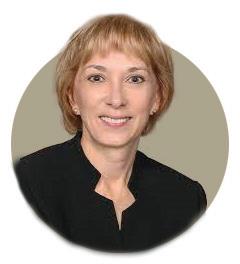
By Shelley Spencer, columnist
the entire industry is focused on returning the talent pipeline to health and Munson Healthcare is actively engaged in these efforts as well.
As is the case with anything so complex, there is no single strategy that will cure the problem. Munson is focusing its energy on three areas to reduce nursing vacancies:
• Aggressive recruitment of registered nurses
• Engaging the next generation of caregivers
• Building and nurturing a culture of growth and balance, personally and professionally
During last November’s TC Connect Annual Economic Summit, Michigan Chief Deputy Treasurer Jeff Guilfoyle commented on the Traverse City area’s “amazing unemployment rate,” which was three-quarters of a point lower than the state at the time. While we remain committed to recruiting locally, there is only a small pool of candidates, which is true for almost every sector of our local economy. As a result, we’ve reached out across the state and Midwest region to recruit registered nurses. We’ve had some success
with targeted campaigns in markets like Grand Rapids, Detroit and Chicago. Overall, demand for nurses remains very high and supply very low, so more recently we’ve taken a page from other health system’s playbooks and extended our search internationally.
Henry Ford Health System in southeast Michigan has been very pleased with the nurses they have recruited from the Philippines. Munson Medical Center nursing leaders traveled there this past fall and secured commitments from more than 170 qualified candidates who would be compensated under the same collective bargaining agreement as our current nurses. We are currently navigating the work visa process to begin bringing these nurses to Traverse City with the understanding that uncertainty at the federal level could impact our timeline.
International recruiting is designed to serve as a bridge while a movement to re-energize people about careers in healthcare gains momentum here at home. Munson is already engaging with Traverse City Area Public Schools and the Career Tech Center to educate students about the many opportunities in healthcare, including nursing.
Each year, hundreds of nursing students gain clinical experience under the mentorship of our team. Munson benefits from a strong relationship with Northwestern Michigan College, which is now able to offer a bachelor of science in nursing through its partnership with Davenport University. Our nursing leaders are personally spending time at community colleges and universities across the state to build relationships through our early hire program.
Equally, if not more important than attracting nurses, is retaining them. While Munson’s retention rate is better than the national average, nursing is still a profes-
sion with among the highest turnover, particularly in the first year.
Over the last three years, Munson Medical Center has offered a Nurse Residency Program. The year-long program is designed to help new nurses advance their skills, decision-making and support professional transition into their first year of nursing. The support provided through this program has helped reduce stress, increase confidence and resulted in retention that far exceeds the average for nurses nationwide.
An organization’s core values and culture are central to its success. Our healthcare team has played an active role in helping define the core values that serve as our foundation. Munson has dedicated teams to focus exclusively on this important work, launching new programs around wellness and others that help drive personal and professional growth. There are new venues in place to recognize and reward our employees for the values they embody. Group activities like our sports clubs provide the opportunity for connection and camaraderie.
Above all, it is the feedback from our employees that gives direction to these efforts. We conduct culture surveys throughout the year to better understand where we are meeting the needs of our employees and where we have opportunity.
Whether it is bringing new talent to northern Michigan, rebuilding the talent pipeline or strengthening a culture of growth and balance, each takes time and intention. We remain committed to staying the course in these critical areas just as we are grateful to every member of our healthcare team for their unwavering dedication to serving our communities.
Joe Hurshe, FACHE, is president and CEO of Munson Medical Center. Shelley Spencer is chief human resources officer at Munson Healthcare.

By Art Bukowski
As the old saying goes, the only thing certain about life is that it’s going to end. And while death is about as universal as it gets, the situations and circumstances leading up to death and its aftermath are (like so many things in our modern world) far more complex and nuanced than in years past.
Options and services for those who are dying – and their loved ones – have expanded greatly in recent decades. From having your body composted to working closely with a death doula, much more thought has been put into how we die, what happens to our remains and those we leave behind.
Several organizations throughout the Grand Traverse region exist to serve dying people and their loved ones. The TCBN digs in to find out the latest in the world of death and dying.
Most people are familiar with the term, but even in 2025 there is plenty of misconception about what hospice entails and who it’s used for.
Broadly speaking, people are eligible for hospice care after a doctor has determined that they have six months or less to live.
Hospice services themselves are usually covered by Medicare, though there may be additional facility (or other) fees depending on the situation.
While Munson Medical Center has an eight-bed designated hospice house, the overwhelming majority of people who receive hospice care from Munson or other hospice organizations receive it at home or in another care facility. Professionals with specific hospice training provide medical care along with emotional, social and logistical support.
In some ways, hospice care can be compared to the controlled descent of an aircraft. These professionals work to give their patients the best experience possible within their remaining days.
“We nurses go to school and learn to look at a disease and try to make it better. But as a hospice nurse, the goal is no longer to make (the disease) better,” said Ryan Campbell, executive director of Heartland Hospice in Traverse City. “We need to make them comfortable, and we know how to make them comfortable as they decline.”
That’s not to say folks that enter hospice care are simply doped up and left to die. On the contrary, the dedicated, around-the-clock care in a managed setting has been shown to have significant posi-
“As a patient is approaching their final chapters of life, it often turns out that less is more. It doesn’t mean that hospice care does less. It means that less aggressive and less invasive treatments or therapies (are the better path).”
– Dr. Roman Barraza, Medical Director, Munson Hospice
tive outcomes in quality of life.
“That’s still a big myth of hospice, that it’s just for the last moments,” Campbell said. “But there are studies that show that if somebody (starts hospice) early enough, they actually live longer because they have more support and more care.”
Perhaps one of the biggest benefits of hospice involves where care is provided, says Dr. Roman Barraza, medical director for Munson’s hospice services. Nurses and physicians are on call 24-7 and prepared

to travel. Repeated trips to the emergency room are replaced with care in a far less stressful setting.
“A wonderful benefit of hospice is that medical care comes to you,” Barraza said.
“If something develops, instead of calling 911, you call the hospice number … and they’ll come to your home, even if it’s two o’clock at night.”
Hospice professionals strongly bristle at the notion that entering hospice amounts to a patient “giving up” – a mindset that

persists with some patients and even their non-hospice doctors and care providers. Rather, hospice workers say, it’s simply a matter of shifting priorities.
“We look at it as a choice,” Campbell said. “People are choosing to no longer pursue appointments, scans, medications. They want to enjoy the time they have, and we do see people – especially when you look at some of the cancers – peak again and feel pretty good when they stop all the heavy-duty medications.”
Barraza echoes those sentiments.
“As a patient is approaching their final chapters of life, it often turns out that less is more,” he said. “It doesn’t mean that hospice care does less. It means that less aggressive and less invasive treatments or therapies (are the better path).”
What’s more, hospice is often a major blessing for patients’ families, as the care coordinated by hospice workers – getting prescriptions, arranging nurses, sourcing and providing equipment and much more – is a lot for them to handle on their own.
“When we can drop in and provide all

of that, most of our families are amazed and relieved,” said Elizabeth Bradfield, a hospice care consultant with Heartland. “We have families tell us that they had no idea how over their head they were until we showed up. They’re just exhausted.”
Campbell and other hospice profes to experts, and really, we need to do the same thing with end of life,” Campbell said. “It should be a preparation. Spend time with your family, maximize comfort, maximize the very most of every minute you have left. And that’s what we do as a hospice team.”






ly Perfectly Human” and her profession, which is quickly gaining notoriety.
Arthur is an attorney, professor and death doula – someone who provides non-medical support, companionship and guidance to individuals and their families during the dying process and after death.
This field is growing considerably, with thousands of people (overwhelmingly women) getting their death doula training over the past decade. Alua’s organization, Going With Grace, is one of a few organizations that train people for this role.
“Folks are coming to learn how to do this work because they understand there’s a need for it in their community,” Arthur said. “Going With Grace alone has trained 3,000 people.”
These people come from all sorts of backgrounds, Arthur says. Doctors, lawyers, accountants, therapists, yoga teachers – all compelled to learn more about supporting people (and their families) at end-of-life. Many go on to serve as death doulas on a part-time basis while continuing other careers, though plenty pursue it full time.
“There were hairdressers in our last cohort. People come in and sit in their chairs and just pour their heart out to them, and they wanted some training on how to deal with death and dying,” Arthur said.
Training adds much more depth and knowledge to folks who are already providing the service in their communities in
“Anyone who has been at the bedside of somebody and has found peace within themselves or was able to help create peace for that other person, that’s a death doula,” she said.
While there is certainly overlap with the type of care provided by hospice (or other) professionals, doulas pride themselves in spiritual and emotional well-being. They want those in their care fully prepared for death – to make, as Arthur puts it, their “life line up” with their passing.
One of the more practical benefits of hiring a doula is that they can help tie up the loose “business” ends of a person’s life, both for themselves and for their families. By gathering vital information about various accounts, assets, involvements and more, doulas can ease the process for the loved ones who remain.
“When my brother-in-law was in the hospital … it became clear to me that all of the information he had about how to run his life was going to die with him,” she said. “Unless people know what you want or how to run your life, someone else is going to have to pick up the pieces.”
Arthur could not say how many death doulas exist in northern Michigan, but they are here. Local nurse practitioner and board-certified hospice worker Stephanie Horanic-Videan recently completed her training and is aware of a “handful” of others in the Traverse City area who have done

strong growth locally in the coming years.
For Horanic-Videan, what drew her to death doula training was the realization that she deeply enjoyed the emotional and companionship aspects of her work with dying patients.
“I like stepping away from … all the clinical stuff and just sitting there and being in the moment. It’s such a privilege and a sacred moment to be there with
Housed in Traverse City founding father Perry Hannah’s palatial estate, Reynolds Jonkhoff has long been the gold standard for Traverse City funeral homes. Tens of thousands of local residents have had their services at the sixth-generation business over the years.
Co-owner and funeral director Lindsey

“I feel a great honor of caring for decedents because, let’s face it, not many people want to do this,” she said. “And then I feel even more honor helping people with their grief journey and starting that next chapter of life. We’re here to help them turn the page.”
She grew up in the business and saw firsthand what it meant to others in the community.
“Quite literally one of the reasons I became a funeral director is that when we would go out to eat at restaurants, my dad would always get big hugs from people. He’d get a hug no matter where we went,” she said. “It’s such a pivotal time in people’s lives, and we’re really appreciated in a unique way.”
Most people opt for cremation instead of a traditional burial these days, Rogers says, a trend that’s held steady for decades. Part of that is the cost, and part is that people in our increasingly mobile societies aren’t tied to places (and therefore cemeteries) like they once were. People also like the idea of being able to have their ashes spread in one or more spots, Rogers says.
But whereas you used to have two choices – burial or cremation – the options have now exploded. As just one of many, many examples, there’s a company in New Mexico that converts remains into several stones that can be dispersed among family members or it into nature.
“You can (be planted) as a tree. You can be shot into space. You can be put into rifle shells. You can be a coral reef in the Caribbean,” Rogers said. “The choices are overwhelming.”
“Green” burial in particular is becoming more popular, with remains housed in biodegradable caskets that are allowed to decompose naturally in the earth. Some companies even convert remains into soil for use in planting trees or other projects, though that process is not yet allowed in Michigan.
As far as other trends go, Rogers says people are looking for their services to be a little less somber – or at least less somber-sounding.
“Hardly anyone wants the word ‘funeral’ anymore,” she said. “They want a gathering. They want an open house. They want a celebration of life. Basically, they want a party – to go out and have a toast.”
Reynolds Jonkhoff puts a ton of focus on pre-planning, with two staffers dedicated to the process. They encourage clients to think about their funerals well in advance their deaths (usually as part of the estate/will planning process). With as many as 80 individual decisions to be made as part of an average funeral service, pre-planning can be tremendously beneficial.
“Fifty percent of our families that we care for have already pre-planned, and I know exactly what they want when the death occurs,” Rogers said. “And it’s a huge gift for the family because all we have to do is make it happen.”

Local company Earthly After, founded by former Leelanau County Commissioner Jamie Kramer, is one such organization that provides an alternative to traditional funeral services.
The relatively new company provides “eco-friendly, affordable scattering ceremonies that celebrate life and protect nature.” Kramer has approval from Sleeping Bear Dunes National Lakeshore for this purpose and is working on getting clearance at several additional national parks.
Many things converged to bring this idea to life for Kramer, who always felt that traditional services, burials and cremations felt stark and unfulfilling.
A particularly impactful event was her dear friend having to pick up ashes in a plain cardboard box after getting a blunt call from an out-of-state crematory informing her that her “mom is ready to be picked up.”
Meanwhile, Kramer dealt with death herself on several occasions and found that nature always gave her comfort, so she wanted to bring the two ideas into one. In addition to providing biodegradable urns, Earthly After will coordinate services out in the beauty of nature.
“When we’re in nature, we have peak moments of connection. And if you take those peak moments of connection when you’re also grieving a loved one or trying to experience the essence of who they were, those things really sit well together,” she said.
In addition to smaller, private services, Earthy After will soon launch “communal memorial options,” with a June event at Sleeping Bear set to feature a “butterfly liberation, floral de sign touchstones, music, readings and a rehabilitated raptor release” while loved ones scatter ashes.
In the long-term, Kramer’s vision is for Earthly After to have its own conservation forests, which would essentially
Our team focuses on preventative care and health management by developing long-term relationships with our patients. We want the best overall health possible for you and your family.


We are now offering injections to treat the appearance of dynamic wrinkles that appear when you make facial expressions. The product we are offering is called Xeomin, which is preservative free, but offers the same active ingredient as Botox. Treatments are done right at our office which provides convenience, privacy, easy-access and continuity of care for your peace of mind!


function as natural cemeteries. Families could purchase the rights to a family tree on the land and then bury the cremated remains of loved ones beneath that tree.
After a person reaches the end, it’s very common that they leave behind loved ones who struggle with grief and loss.
Founded in 2001, Michael’s Place is a grief support organization in Traverse City that provides (among other services) peer-facilitated support groups where grieving people can connect with others in their shoes.
“We are a service to help people who are feeling like they want a community as they mourn and grieve a loss, and they want to find normalcy,” said long-time Executive Director Mindy Buell. “They don’t want to be on an island and isolated from everybody else.”
These groups are broken down by the type of loss (spouse, sudden death, etc.), allowing participants to be surrounded by people who understand what they’re going through.
“Losing a loved one to suicide, for example, that’s very specific, and with a lot of complicating layers,” Buell said. “We want to have support groups that are very specific for people.”
Peer-based support groups are distinct
from actual grief counseling, Buell says, but they offer their own set of tremendous benefits. Healing can accelerate when people feel heard, validated and supported.
“We’re looking for what we would call the ‘Ah-ha moment.’ They realize that no matter what the circumstances are, they’re not alone and they don’t have to do this by themselves.” Buell said. “It’s very complementary of what someone gets from one-on-one therapy.”
Sarah Schultz, grief services coordinator for Michael’s place, is herself a licensed counselor. Everyone who comes to Michael’s Place meets with one at the start of the process, not to provide counseling but to make sure they won’t need assistance beyond what Michael’s Place can provide.
“I have a lot of people come in that are seeing an individual therapist and they just want more,” Schultz said. “They really want those support groups.”
Thousands of grieving people have found solace at Michael’s Place over the years. Some people for as briefly as one session, others stick with the program for many months or years. The entire operation is supported by donors, grant funding and an army of volunteers.
“We’re so fortunate to get the best of the best when it comes to volunteers,” Buell said. “And that goes to people who work in our front office to greet families

who are coming in, or people who are serving as volunteer facilitators or navigators, all the way through committee members and board members.”
Among Michael’s Place’s other programming is Robin’s Nest, a family program designed to help grieving children and their families find joy and create new memories via a variety of activities. The organization also works closely with schools and employers to develop proven plans for grief support before tragedy strikes.

At Munson, we know what commitment means. And we’ve been living it for over 100 years. It’s caring for you through your entire journey. With soft words and a soothing touch. With dignity and respect. Relieving your pain, easing your discomfort, and restoring hope.


Once you realize how many resources may be available and begin your research on college financial assistance, you could be on your way toward easing some of the anxiety often associated with paying for higher education.
According to the College Board’s “Trends in College Pricing and Student Aid 2024,” approximately $257 billion in student aid in the form of grants, Federal Work-Study (FWS), federal loans, and federal tax credits and deductions was awarded to undergraduate and graduate students in 2023 – 2024.
During that academic year, undergraduate students received an average of $16,360 per full-time equivalent (FTE) student in financial aid: $11,610 in grants, $3,900 in federal loans, $760 in education tax credits and deductions, and $90 in FWS.
4 lessons for seeking help with college costs
Start planning during the high school years. Look to reposition assets or adjust income in the calendar years before your child’s sophomore year. For example, if the student is applying for financial aid for the 2025-2026 school year, the federal aid application will include income from the 2023 tax year (two years prior).
Assume you’re eligible for aid … until you’re told you’re not. There are no specific guidelines or rules of thumb that can accurately predict the aid you and your child may be offered. Because each family’s circumstances are different, keep an open mind as you consider financial aid alternatives.
Two forms will be key to your aid application process: the Free Application for Federal Student Aid (FAFSA) and the College Scholarship Service Financial Aid Profile (CSS Profile). The FAFSA helps you apply for federal aid, and many states use it to determine a resident student’s eligibility for state aid. Many schools use the CSS Profile to collect additional information before awarding their own funds, i.e., institutional student aid.
Reassess assets held by your children. Federal guidelines expect children to contribute 20% of their assets toward their education’s costs while parents are expected to contribute up to 5.64%.
Assets held in custodial accounts (bank accounts, trust funds, brokerage accounts) in your children’s names may reduce the aid for which your family qualifies more so since they are assessed at the 20% rate. While assets held in Coverdell Education Savings Accounts (ESAs) and 529 plan accounts (if owned by the dependent student or the parent) are factored into the parents’ formula, having less effect on the aid for which the family qualifies.
Apply to multiple schools and compare financial aid awards. This is especially important if there is a noncustodial stepparent because some colleges count this person’s resources while others do not. You may also want to consider asking the financial aid officer for more aid if the current award is not enough for attendance — all they can say is “no.” If there are extenuating circumstances, be sure to attach a letter of explanation to the application.
Please consider the investment objectives, risks, charges, and expenses carefully before investing in a 529 savings plan. The official statement, which contains this and other information, can be obtained by calling your financial advisor. Read it carefully before you invest.















By Andi Dolan, columnist
Employee wellness today goes far beyond physical health – it encompasses mental, emotional and financial well-being. As expectations around benefits are shifting, wellness programs are evolving into more personalized, data-driven and holistic experiences that support employees both in and out of the workplace.
To keep pace and deliver real value, organizations must focus on flexibility, relevance and measurable impact. By designing benefits that meet the diverse needs of a multi-generational talent pool, companies can improve retention, boost productivity and foster a healthier culture – all without overspending.
Here are nimble strategies to modernize your wellness approach:
Provide Tailored and Adaptable Solutions
One-size-fits-all programs no longer meet the diverse needs of today’s workforce. Employees have different priorities depending on their life stage, health goals and personal circumstances.
An emerging approach is offering flexible benefits that allow individuals to choose what supports their own health and happiness.
Stipends are a practical and cost-effective solution. They can be used across a variety of categories, such as gym memberships, therapy or counseling, fitness classes, apps like Calm or Headspace, nutrition coaching or even ergonomic equipment. This personalized model empowers investment in the resources that matter most to them.
Inspiring your organization to personalize their wellness journey boosts engagement and demonstrates a genuine commitment to their unique needs. The result is a more inclusive, responsive and impactful strategy, without the high price tag of traditional, mono-sized plans.
Place Mental and Emotional Well-being at the Forefront
Mental health continues to be a top concern for today’s labor force, especially

in high-stress or fast-paced work environments. Stress management tools are no longer a luxury – they are an expectation. Provide access to confidential counseling services and ample mental health days.
An affordable option can include an Employee Assistance Program (EAP). This offers confidential support to help manage personal or work-related challenges that could impact performance or wellbeing. Pine Rest is an EAP offering accessible employee therapy, executive coaching and team-building services. Betterhelp Business is 100% online and another EAP worth consideration.
Even the smallest investments in mental health can lead to meaningful gains in morale, engagement and productivity while fostering a healthier, more resilient team.
Utilize Technology to Enhance Engagement
Digital tools and wearables are transforming the way organizations approach wellness. From tracking physical activity and sleep patterns to monitoring stress levels, digital platforms provide real-time insights that help identify trends and tailor support to your team’s needs.
Platforms like Wellable offers customizable solutions that include success coaches, reward programs, health challenges, on-demand health classes and nutritional support. With reasonable tiered pricing, participating employees can have access to wellness tech even for small- and midsized businesses.
Leveraging technology promotes a proactive culture, empowering employees to take charge of their health.
Wellness doesn’t have to exist outside of the 9-to-5 workday. Encouraging regular breaks, conducting walking meetings, movement challenges and designated “no-meeting” hours can embed wellness into the workday.
Promoting flexible schedules or hybrid work models may equip employees with the perfect equilibrium to manage stress and maintain work-life balance. These changes don’t require major budget adjustments but can have a profound impact on job satisfaction and performance.
A culture that supports healthy routines during the workday reinforces the company’s commitment to well-being.
Organizational wellness needs are constantly evolving, making continuous feedback essential.
Regular surveys and efficient input sessions help organizations gauge what actually is working and where gaps exist. By using this insight to guide decision-making, companies can ensure health initiatives remain relevant, inclusive and aligned with employee priorities.
The simplicity of feedback can reveal underused initiatives, allowing resources to be redirected toward higher-impact efforts. This not only boosts effectiveness, but also maximizes the return on investment.
As the cost of living fluctuates and
financial stressors grow, supporting employees’ financial well-being is just as vital as addressing physical and mental health. Financial fitness can include budgeting workshops, retirement planning support and access to debt management or student loan assistance tools. Partnering with financial apps such as LearnLux provides logical tools to manage money, build savings and plan for a future. These resources help reduce financial anxiety, leading to better focus and productivity and overall happiness at work.
When individuals feel financially secure, they are not only more focused and productive at work … they are also more engaged, motivated and loyal to their organization.
Implementing or enhancing a wellness program doesn’t have to break the bank. By focusing on flexibility, personalization and daily integration along with a commitment to ongoing feedback, business owners can build a strategy that works for everyone.
The payoff? A more energized, resilient and loyal workforce that helps drive business success. In an increasingly competitive labor market, a well-crafted wellness strategy isn’t just nice to have ... it’s a strategic advantage!
Just do it!
Andi Dolan is the owner of Traverse Benefits, a local independent insurance agency advocating and providing health, life and disability solutions for employers, individuals and Medicare beneficiaries across northern Michigan.


Anne and Luke Schwartz have seen it all. With a lifetime in the real estate and construction industries, the owners of Turning Leaf Fine Homes are well aware of the trials and tribulations of buying, selling and building homes. That’s why they are considered experts when it comes to working with you to find your next dream home.
Anne is an associate broker with Century 21 Northland. She has worked for 20 years in the real estate industry, assisting buyers and sellers through the process. Luke grew up in the construction business. He worked alongside numerous carpenters, craftsmen and specialists in the skilled trades, giving him knowledge of and appreciation for detailed work. Together they have built Turning Leaf Fine Homes into one of the region’s preeminent full-service home-building and renovation companies, making sure your experience is seamless and headache-free.
Both Luke and Anne have multi-generational roots in The Traverse City area. They appreciate the region’s natural beauty and culture, and share the love for their city and the area with their four children. They’re
happy to share it with you as well.
What is your background?
Luke’s father was a builder and general contractor, and a young Luke apprenticed with many of the area’s best and best-known experts, who passed on their knowledge and skills. Now some two decades later, he continues seeking ways in which he can improve his knowledge and skills and use technology to benefit their clients. In 2006 Luke began to offer custom home design plans using CAD technology.
Anne began her real estate journey locally and found her perfect fit at Century 21 Northland. As an active Realtor, she is able to advise clients on what is available and where the market is likely to go. She is hands-on with the business operation at Turning Leaf and assists clients with interior design selections.
What makes Turning Leaf different?
Both Anne and Luke work directly with clients, meeting with them and getting to know them and what they want in a home. That hands-on approach provides the best fit possible between clients and the finished product. They also help clients develop their
budget. During the build, Luke is onsite every day, working alongside the rest of the crew.
When is the best time to buy? To sell?
While you may have heard the terms “buyer’s market” and “seller’s market,” the best time to either buy or sell comes down to individual circumstances. So it’s always necessary to consider your needs, your finances and what the market has to offer.
Why should I build a house instead of buying one?
The first priority is always you, the client. That is why it is important to do due diligence regarding what is for sale in the market. Given the continued desirability of the area, the inventory of homes for sale may not offer you the best match for your needs, lifestyle and budget. Only when we cannot find a home for sale that suits you and your lifestyle will we look at a new build.
How much does it cost to build a home?
Each client has different needs and wants that will drive the material selections and, in turn, the cost to build.
Typically, we start with the client’s needs to establish a general idea of basic costs and then determine where to set the budget for the material selections.
What special features do you offer in your homes?
Our homes offer the features you want. It is all about personalization –this is your home, and should reflect your style.
So we will work with you on every decision, from design and layout to the materials. Whether that means marble, granite or quartz counters or wood floors, a deck with an outdoor kitchen or a big backyard, a low-maintenance setting or something else entirely, we will make sure it’s all about you. With our broad experience, we can present you with options and ideas you might never have thought of otherwise. Whether it’s retirement home or a dream getaway, a home for a growing family or one for empty-nesters, it’s all about knowing and serving you.
There is one feature we include in all our homes. No matter your style or preferences, we will make sure your home is as energy efficient as possible. That helps keep you healthy and your energy costs as low as possible.




By Craig Manning
East Lansing. Ann Arbor. Allendale. Marquette. Mount Pleasant.
Each of these cities is one of Michigan’s thriving college towns, and all of them are inextricably linked with the identities of a major public university. While Michigan’s leading institutions of higher education are closely tied with their geographical epicenters, they also have tendrils that reach out across the state. To give a sense of how some of those tendrils touch and impact northern Michigan, the TCBN sat down with five individuals who represent a major Michigan university in different ways – and who do that work right here in Traverse City.
The job: My job is to build new research collaborations and opportunities, as well to ensure the university adheres to state and federal regulations.
The northern Michigan impact: Michigan Tech looks for northern Michigan impact in all that we do. Particularly in the area of water research, our researchers at the Great Lakes Research Center, the Michigan Tech Research Institute and the Ecosystems Science Center work extensively in the northern Lake Michigan/Huron region. We make the Straits of Mackinac safer and monitor impacts of coastal erosion. We work to keep the Great Lakes clean and accessible for everyone in the region, from beach safety, to drinking water, to fisheries monitoring.
The benefit to the university: Traverse City offers a vibrant entrepreneurial ecosystem. This scene benefits Michigan Tech researchers with new ways to commercialize technology and directly impact consumers.
The big goal for the next one to two years: As a board member for the Freshwater Research and Innovation Center (FRIC), I look forward to helping that group make FRIC a success through fostering research partnerships in the region.
NOTE: Though he’s been working at Michigan Tech for more than a decade, Barnard is new to the VP for research role – and therefore, not as familiar a face to Traverse Citians as some of the other individuals featured in this article. Barnard stepped into that role in July of last year, taking over some of the responsibilities of Jay Meldrum, who had

served as Michigan Tech’s liaison to the Grand Traverse area since 2021, when the university opened an office in the Traverse Connect building. That on-theground presence was intended to support Michigan Tech’s growing list of Traverse City partnerships.
According to Meldrum, he “officially retired” from Michigan Tech on June 30, 2024, a milestone that coincided with Michigan Tech pulling back some of its presence in northern Lower Michigan.
“We closed our office at Traverse
ANDREW BARNARD, PHD Vice President for Research
Connect,” Meldrum said, before adding that “Michigan Tech is still involved in Traverse City in many ways.” Those partnerships include Michigan Tech’s role in the FRIC project; its “2+2” program with Northwestern Michigan College (NMC), which allows NMC students to attend two years locally and two years at Michigan Tech’s campus in Marquette; scholarships for Traverse City graduates to attend Michigan Tech’s engineering academy; and summer STEM programs with NMC’s College for Kids.
The job: In my role as District 3 Director, I provide administrative oversight for our six local MSU Extension offices in Grand Traverse, Benzie, Manistee, Leelanau, Antrim and Kalkaska Counties. In addition to this responsibility, my main goal every day is to link Michigan State University resources – outreach and research – to critical issues facing our residents, businesses, and communities. Listening to stakeholders, finding out what the needs are, and linking them back to MSU staff who are providing education or reach around that need.
The northern Michigan impact: I see the positive impacts in our counties every day. It can be something like when families receive a healthy recipe to make a food item they received at the food pantry. It can look like bringing cutting-edge conferences to stakeholders, like the wine grape industry at the annual Dirt to Glass Conference. It can mean supporting local entrepreneurs to bring their new food or agriculture business from idea to the marketplace; MSU Product Center staff help these new businesses understand and adapt to the regulatory or production processes that often make it a challenge for new products to be developed. It can mean supporting our local agriculture community through growing best practices, business diversification, farm accommodations to accommodate aging and disability, managing farm stress and
succession planning. And there are so many other examples.
The benefit to the university: MSU Extension is the outreach arm of MSU, and it’s present in all 83 counties within the state, providing community-based education to residents in fulfillment of our land grant mission. Being present in each county is important because we bring the knowledge of the university to everyone within the state without the need to be present at our East Lansing campus. It’s right there in our mission: ‘MSU Extension helps people improve their lives by bringing the vast knowledge resources of MSU directly to individuals, communities and businesses.’
Our work benefits the university by bringing knowledge to all within the state regardless of access to the university.
The big goal for the next one to two years: I would say, right now, our local team’s largest effort is around agriculture sustainability. When residents are asked about why they live in northern Michigan, the answer is usually that they live here for our natural resources and beautiful environment. Maintaining our rural agriculture roots is essential to preserve our lovely surroundings. Local growers are struggling with a variety of economic pressures – imports, pests, labor – that are affecting their profitability within the large variety of local agriculture products we thoughtfully grow. The challenge for our local growers is to remain profitable and be able to maintain
a livable wage for their livelihood. If this doesn’t happen, our local growers will sell off their farms and that will forever change our local landscape.
We’re trying to help in multiple ways. Our team at the Northwest Michigan Horticulture Research Center team is committed to identifying the best growing practices and innovative new technologies to economically sustain growers in our region. They conduct research on their 137-acre MSU farm and provide education to local growers on what they learn, along with best practices for dealing with growing pressures.
Coupled with teaching best growing practices, helping local growers diversify their business through other mechanisms is another strategy we are employing through MSU Extension. In 2024, MSU Extension hosted an Agritourism Summit in Traverse City for the first time, and we have begun planning for our next event in 2026 due to stakeholder and partner requests. The 2024 event was very successful, and the summit goal was to bring together local growers, municipalities, planning and zoning professionals, and entrepreneurs to learn more about how agritourism can be effectively executed in their communities to benefit residents, townships and local growers.
So, our local team supporting our agriculture community is committed to a multi-faceted strategy to support our local growers, so they can be able to operate a successful business into the future.

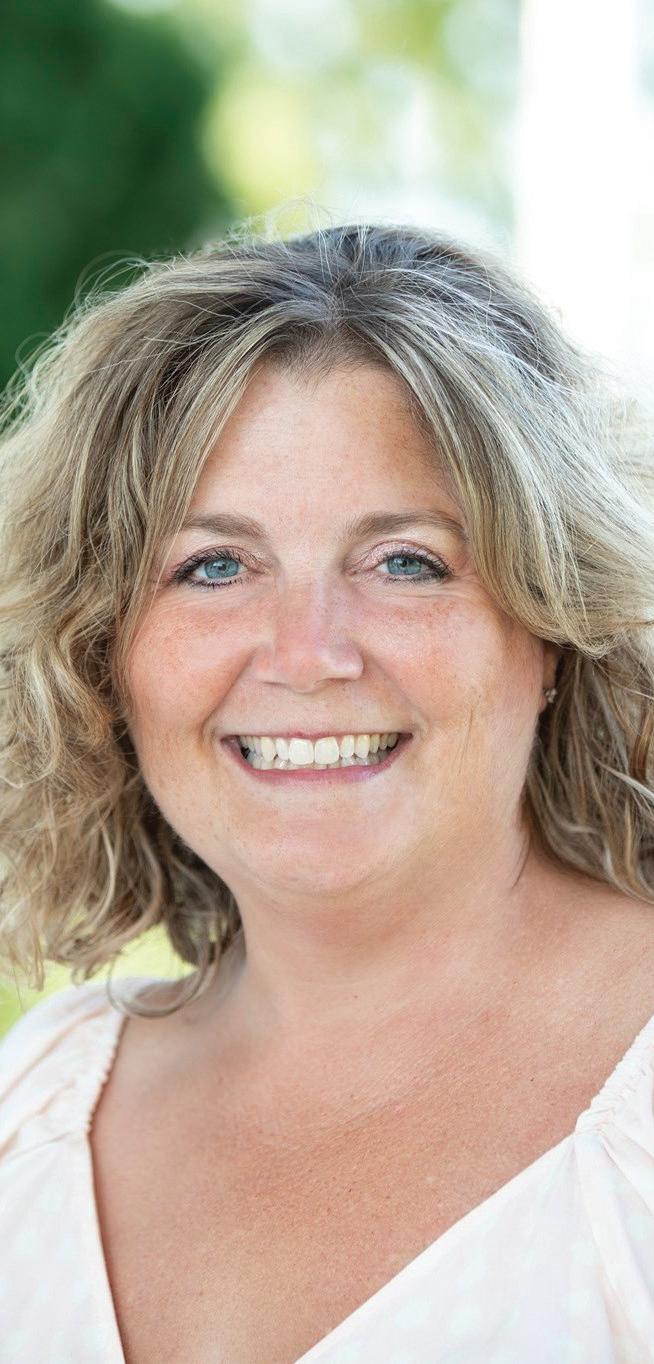
District 3 Director Michigan State University Extension




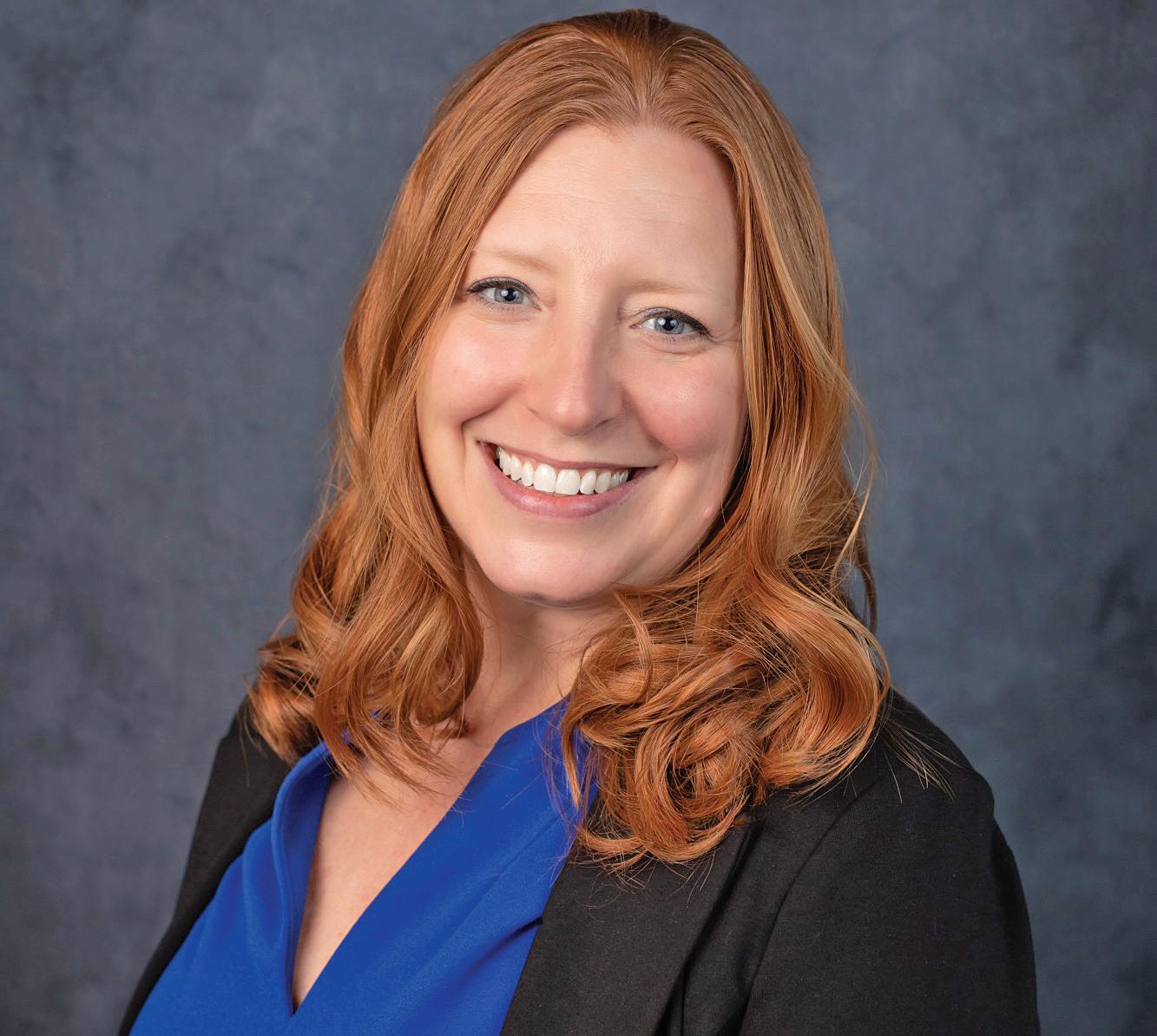
The job: As the director of the northern Michigan region for GVSU, I serve as a connector between the university and the greater northern Michigan community. My role focuses on building strong partnerships, supporting students, and advancing educational access in the region. I’m committed to ensuring that our services meet the unique needs of northern Michigan.
In addition, I support students, faculty and staff as they engage with the community – whether through academic programs, research, or outreach efforts. This work reflects GVSU’s broader mission to be a student-centered institution that’s deeply embedded in the communities we serve. Through GVSU Omni, we’re able to extend that mission by offering flexible, community-driven pathways that meet
learners where they are – especially in rural and regional areas like ours.
The northern Michigan impact: Our presence in northern Michigan creates flexible, responsive pathways to higher education that are deeply rooted in community needs. Whether it’s supporting adult learners at the NMC University Center, assisting employers with workforce development, or creating spaces for innovation and collaboration, GVSU is, I think, actively contributing to the region’s vitality and future. We’re not merely offering courses; we’re cultivating talent, encouraging entrepreneurship, and building a sense of belonging for learners of all backgrounds.
The support we provide is specifically tailored to the needs of northern Michigan students. For example, in March we hosted
a ‘Networking and Connect’ event at the Hagerty Center, because we understand that a strong network is crucial for securing internships and jobs after graduation. Our local presence also motivates students to stay and work in the area, which strengthens the regional talent pool and supports long-term economic development. I often hear students say, ‘If this opportunity wasn’t available here in Traverse City, I wouldn’t have pursued my education,’ and it’s incredibly rewarding to see the positive impact we have every day.
The benefit to the university: Being embedded in the Traverse City community provides GVSU with invaluable insight into the unique needs and opportunities of rural and regional learners. As our most established regional center, the GVSU Traverse City Center serves as a space for innovation, particularly in developing flexible learning models and strengthening transfer partnerships.
One key example is our Direct Connect initiative with NMC, which allows local students to indicate their interest in GVSU from the moment they begin at NMC. This early connection enables us to provide wraparound support services and ensure a seamless transfer experience.
Having a presence in Traverse City also allows GVSU to extend its mission beyond the lower west Michigan region and truly live out its commitment to statewide impact. GVSU Omni plays a critical role in this effort, providing a coordinated framework to connect learners, faculty, and partners across the state through high-impact practices and innovative learning pathways.
Through immersive experiences like our ‘Wicked Problems of Sustainability’ course – a week-long experiential learning opportunity – students engage with real-world challenges in the living laboratory of freshwater, gaining hands-on experience that connects directly to the region’s natural assets.
The big goal for the next one to two years: There’s so much I’m excited about in the next couple of years. One of my main goals is to grow GVSU’s presence and impact in northern Michigan by strengthening partnerships, expanding programming, and leaning into the unique opportunities this region offers. We’re especially focused on aligning our work with regional priorities like freshwater innovation, rural health access and entrepreneurship.
One of our top priorities is advancing freshwater research and innovation in collaboration with NMC’s Great Lakes Institute and the upcoming Freshwater Research & Innovation Center. By creating stronger ties between this local asset and GVSU’s Annis Water Resources Institute (AWRI), we have an incredible opportunity to support northern Michigan as a hub for cutting-edge freshwater research, workforce development, and experiential learning focused on the Great Lakes.
We’re also working to expand access to rural health services by increasing academic programming and community partnerships through GVSU’s College of Health Professions and the Kirkhof College of Nursing. Our goal is to help address persistent healthcare workforce shortages while improving health outcomes across the region.
In addition, we’re committed to filling niche but critical gaps – such as supporting veteran entrepreneurs – by expanding initiatives like the Michigan Veteran Entrepreneur Lab through GVSU’s Center for Entrepreneurship and Innovation. These programs not only support individual learners but also fuel regional economic development and community resilience.
Each of these efforts is part of a larger vision: ensuring GVSU’s presence in northern Michigan is responsive, innovative, and deeply connected to the longterm success of the region.
President of the U-M Club of Grand Traverse University of Michigan
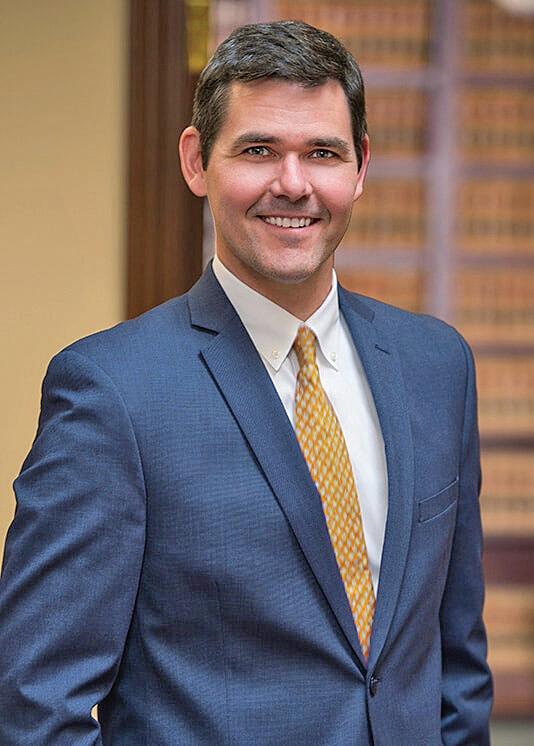
The job: I am the current president of the U-M Club of Grand Traverse, the local chapter of the Alumni Association of the University of Michigan. My role involves supervising club activities, calling and presiding over our monthly board meetings, assisting with the completion of the club’s biannual reports provided to the Alumni Association, and acting as a liaison with the university. I am a small part of our passionate board of directors, which does an excellent job leading our organization.
The northern Michigan impact: The Club’s work is most prominent in its community service events and scholarship program. We hold two or three community service events each year, which provide excellent opportunities for our alumni and friends to spend time together, give back to the local area, and, on occasion, sing the fight song! Recently, we’ve volunteered with the outstanding local organizations like Child & Family Services, the Habitat for Humanity ReStore, Reining Liberty Ranch, and United We Smile. We also host an annual Holiday Happy Hour, at which we collect food and non-food items for certain organizations in need, including United We Smile.

DR. DON UZARSKI
Founding Director of the Institute for Great Lakes Research Central Michigan University
The job: I am the founding director of the CMU Institute for Great Lakes Research, as well as a professor of biology. I lead a basin-wide $30 million, 15-year Great Lakes Coastal wetland monitoring in coordination with the United States Environmental Protection Agency.
The northern Michigan impact: CMU has a larger presence in northern Michigan than just my portion concentrating on the Great Lakes –including CMU Innovation and Online, our provider of online learning solutions, as well as other initiatives.




The benefit to the university: The U-M Club of Grand Traverse’s presence in Traverse City allows the University of Michigan to reach prospective and current students, as well as alumni in the area, via our local presence. Each spring, we hold a scholarship application process during which we solicit applications from admitted students, and typically award seven to nine scholarships per year. In August, we are fortunate to have a student send-off event, at which many of the scholarship recipients, alumni, and students returning and heading off to the university can congregate, share stories and make connections.
The big goal for the next one to two years: We are looking to grow our board and committee size, which will allow us to host a greater variety of events for our members each year, including more robust game watch parties for the University of Michigan’s many outstanding sports teams, networking events, a golf outing and additional community service events. In addition to fostering continued passionate involvement by alumni, students, and friends of the university, increased activity can lead to growing our scholarship program to allow us to give larger scholarships to more students. Go Blue!
From my perspective of the Great Lakes portion, though, we conduct a lot of water quality and fisheries research on the Grand Traverse Bay and also work with FishPass of the Great Lakes Fishery Commission, and have been working closely with NMC and Discovery Pier. Our goal is to have a presence at the new Freshwater Research and Innovation Center. We even plan to move our research vessel and two-man submarine to Discovery Pier this spring, and I already have an office at Traverse Connect. Our research focuses on recognizing water quality and ecosystem integrity issues, while also providing learning opportunities to the community.
The benefit to the university: The FishPass, NMC and Discovery Pier folks are all great to work with, and Traverse City’s location provides an excellent platform for research, education and outreach.
The big goal for the next one to two years: I am currently working on storage space for some of our smaller vessels and on berthing our larger research vessel, the M/V Chippewa, at Discovery Pier. We are – and have been – conducting research on the bay for many years, but I am trying to expand that research substantially and attempting to arrange CMU classes and programs in Traverse City, working directly with NMC.



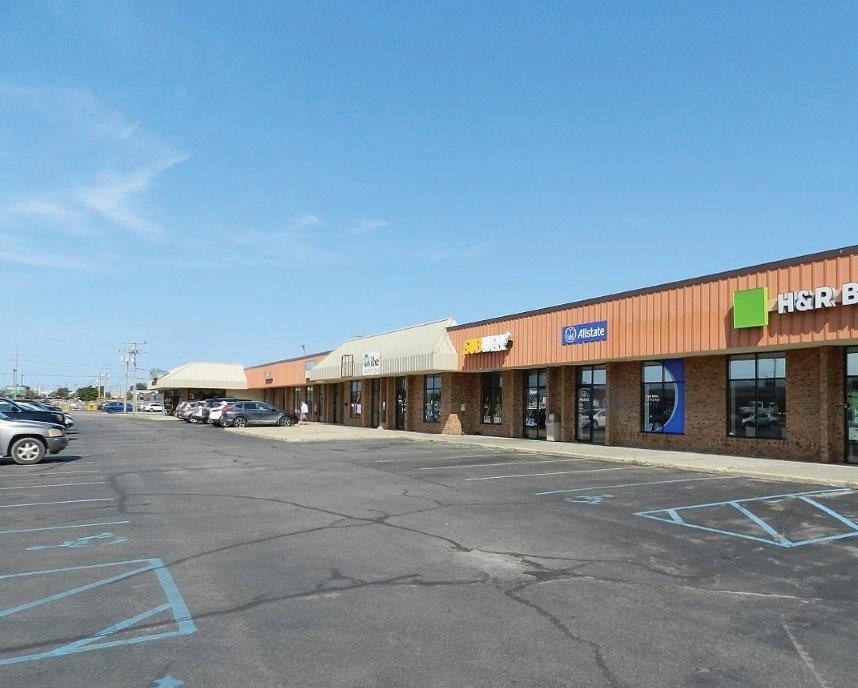



By Nick Nissley, columnist
In a world where change seems to arrive faster each day – technological shifts, economic disruptions and evolving workforce needs – it’s easy to feel unmoored. Higher education, like many sectors, is navigating an era of rapid transformation. Across the country, we see colleges closing, merging or rethinking their missions entirely. But here in northern Michigan, I believe we are charting a different course.
Northern Michigan is a place that knows how to adapt. We understand the value of strong institutions — not because they’re big or loud, but because they’re dependable. In a moment where many national conversations feel chaotic or disconnected from daily life, local institutions like Northwestern Michigan College offer something different: relevance, resilience and results.
That’s not accidental. It’s by design. Community colleges are structured differently than other institutions in higher ed. We are locally governed, deeply rooted in place, and built to evolve alongside the communities we serve. And here at NMC, that design has enabled something remarkable: not just survival, but transformation. Over the past five years, we’ve embraced the need for change — not out of panic, but with purpose. Together with our board of trustees and college leadership, we invested in long-term, strategic transformation. That includes a new strategic plan, a campus master plan to ensure physical and financial sustainability, and most recently, a comprehensive brand strategy. Each of these efforts was designed with this in mind: What does our community need next, and how can NMC deliver it?
And we’re already seeing results. Take the Michigan Achievement Scholarship and Community College Guarantee. In their first year, 474 NMC students benefited — many attending college tuition-free. In fact, 91% of Community College Guarantee recipients are attending NMC without paying tuition, even those who live outside our traditional district. That’s more than

a scholarship program. It’s economic mobility in action.
Or take our Direct Connect transfer partnerships, which are helping the 400+ NMC students who transfer each year do so more efficiently, affordably and confidently. These partnerships are creating clearer, faster pathways to bachelor’s degrees, especially important as more students and families make value-driven decisions about education.
These aren’t just wins for the college. They’re wins for our community and our local economy.
Because while the world may be noisy, our purpose remains clear: NMC exists to serve this region, its students, its employers and its future. That’s our mission. That’s our lane. And because we’re rooted here, we can move quickly and stay focused. That ability to adapt isn’t just our advantage — it’s our responsibility.
But I want to be clear: Being rooted in
place doesn’t mean we think small.
Our students go on to lead in healthcare, manufacturing, entrepreneurship, aviation, marine technology and more. They transfer to universities across the country. They start businesses. They strengthen local industries and global networks. Being “local” doesn’t limit their success — it launches it.
And in a broader sense, I believe institutions that stay connected to the people they serve — businesses included — are better positioned to lead in moments like these. They’re more nimble, more trusted and more grounded in real-world outcomes.
That’s something any organization can take to heart: Stay close to your stakeholders. Plan forward, not backward. Build with clarity and humility. And remember that transformation isn’t a reaction to the moment — it’s a commitment to the future.
As NMC approaches its 75th anniversary in 2026, we’re not just celebrating our history. We’re writing our next chapter. We’re embracing possibility and building momentum — through thoughtful strategy, deep partnerships and a clear sense of purpose.
This is a defining moment, not just for the college, but for our region. Because strong communities aren’t just built by the private sector or the public sector — they’re built by people who believe in what’s possible when we work together.
And in that sense, I believe NMC is a model of what it means to lead through change — not with fear, but with hope. Not with noise, but with clarity. Not alone, but with community.
We’re rooted here. And we’re ready for what’s next.
Dr. Nick Nissley is president of Northwestern Michigan College.







By Craig Manning
Northwestern Michigan College (NMC) tallied an enrollment of 3,390 students for the fall 2024 semester. And while many of those students will go on to earn their degrees from NMC, statistical trends indicate that hundreds of them will end up not as NMC grads, but as transfer students.
“I would say that around half of NMC students enroll here with the intention of transferring to a four-year school to complete their degree,” Lindsey Dickinson, NMC’s director of retention and student services, told the TCBN . “Now, does everyone actually do that? No; we definitely have a lot of students who are
still deciding on their pathway when they enroll, and when they get here, they realize, ‘Oh, wait, I can do what I want to do right here.’ But, certainly, transfers are big with our student body.”
Between 2017 and 2023, 3,256 NMC students transferred elsewhere to pursue the full scope of their educational aspirations. Across those years, NMC’s annual transfer rate ranged from 13.1% to 17.7%. These days, approximately 400 NMC students hit the road for four-year institutions on an annual basis.
According to Dickinson, transfer students have long been a part of NMC’s bottom line. Up until the early 2010s, community colleges in Michigan were not allowed to award any type of bache-
lor’s degree, which meant that any NMC students looking for anything above an associate’s degree had to transfer.
Legislation passed in 2012 opened the door for community colleges to offer a small number of bachelor’s programs, including culinary arts, energy production, concrete technology and maritime technology, and NMC has been growing its four-year offerings ever since. Still, transfers remain a big piece of both NMC’s legacy and its current reality.
In fact, Dickinson herself started school at NMC before transferring elsewhere.
“I graduated from Traverse City Central, before it was Traverse City Central, and I came to NMC because I was some-
one who was absolutely still deciding on what I wanted to do and where I wanted to go next,” Dickinson said. “I spent two years here getting an associate’s degree in science and arts, which is our traditional transfer degree, and then I was able to transfer something like 80 credits to the University of Virginia. I got my degree from there in history, and I was able to graduate in four years, including my time at both NMC and Virginia.”
Dickinson was so pleased with her own NMC transfer experience that she has made it a goal in her job with the college to help students plot similarly successful paths. Whether the student is a recent high school graduate who is undecided about what they want to do with
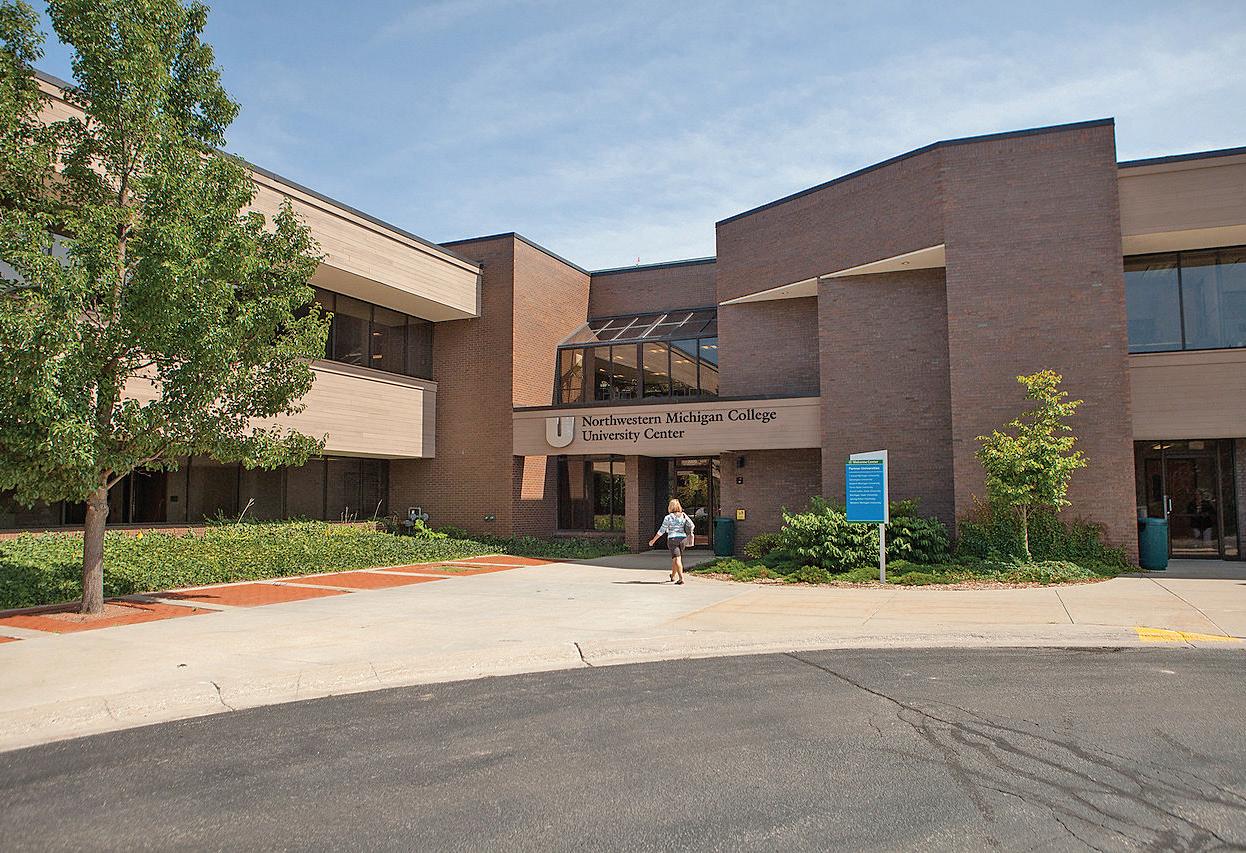
their life, or a middle-aged adult learner coming back to school to finally earn a degree, Dickinson says she and her team of advisors spend a lot of time helping NMC newcomers navigate their options, including transfer pathways.
Some of those pathways are immediately apparent. Thirty years ago this year, NMC opened the University Center, an on-the-ground hub right here in Traverse City where local students could attend courses and earn four-year degrees from major university partners. When it
opened in 1995, the University Center had “more than 40 programs offered by a dozen Michigan colleges and universities,” according to NMC’s website. Since then, University Center partners have awarded over 10,000 degrees via the center, including not just four-year bachelor’s degrees, but also master’s degrees, doctoral degrees and specialty certificates.
Per Dickinson, most students who graduate with degrees through the University Center are NMC transfer

students. They earn general education requirements or other lower-level course credits through NMC, then transfer those credits to one of the University Center’s partner institutions before completing their degree through the center. That structure has allowed many students to earn advanced degrees from respected four-year institutions without ever having to complete coursework outside of the Traverse City area.
Currently, NMC has five University Center partners: Ferris State University,
Grand Valley State University, Michigan State University, Central Michigan University and Davenport University.
Unsurprisingly, the first three of those schools are also NMC’s top three transfer destinations, per spring 2022 data.
“We’ve had some partners come and go over the years, and then some long-standing partners [at the University Center],” Dickinson said. “While our partners change, though, the goal never does, and that is to bring the bachelor’s degree and the support services that



come with pursuing that degree to our students in this region. And what we focus on most with those partners is providing forward pathways that go toward some sort of regional employment that is in demand. That’s our job. We are here to support our community, and so we want to make sure that our partners are helping provide pathways for our students coming from NMC, so that they can go and find employment in our community after they graduate.”
Even beyond the University Center, Dickinson says NMC is constantly working with colleges and universities throughout the state to make sure transfer pathways exists for students who are interested in them. For instance, the fourth most popular transfer destination for NMC students is the University of Michigan.
Even though University of Michigan isn’t currently a University Center partner, Dickinson and her team know there will always be interest among NMC’s high-achieving students to transfer to Michigan’s top university. Keeping that transfer pathway open requires constant behind-the-scenes work.
“We work really intentionally with the partners where we have our highest transfer numbers to make sure things like transfer equivalencies are negotiated, because we do not want our students to lose their credits,” Dickinson said. “That is a constant process.”
On a “systems level,” Dickinson says NMC and other community colleges rely on the Michigan Community College Association to “gather all of the colleges and universities in Michigan together and try to define transfer pathways together.” But while that systemic work benefits all community colleges, it’s just one piece of the puzzle when it comes to the behind-the-scenes legwork.
“There’s also work that happens at a very course-specific level,” Dickinson added. “For example, some schools set expiration dates (on our credit transfers). MSU is one of them, and every five years, we’ve got to push our courses through transfer equivalency again, which means getting our respective academic areas together, making sure the learning outcomes are aligning, and ensuring that their school will accept our credits.”
That push to make transfers as easy as possible, Dickinson thinks, will prove to be even more important going forward, thanks to several new Michigan programs that are driving more students toward community colleges. Those programs, Michigan Reconnect and the Community College Guarantee, have made dollars available specifically for students to attend their local community colleges. Reconnect targets older learners who are looking to go back to school, while the Community College Guarantee incentivizes recent high
“We work really intentionally with the partners where we have our highest transfer numbers to make sure things like transfer equivalencies are negotiated, because we do not want our students to lose their credits. That is a constant process.”
– Lindsey Dickinson, Director of Retention and Student Services, Northwestern Michigan College
school graduates to matriculate to their local community colleges. Between those programs and the ever-rising cost of a university education, Dickinson thinks NMC’s transfer numbers could tick upwards in the years to come.
“In particular, the Community College Guarantee has been huge for students who, in the past, typically would have gone away to school somewhere else,” Dickinson said. “Now, a lot of those students are saying, ‘Well if I have

access to free college, why wouldn’t I take advantage of it? I can take the same classes I’d be doing at CMU in my first two semesters, do those at NMC, get it for free, and then take those credits with me when I transfer.’ We’ve definitely seen an increase in interest in NMC from students coming out of the local high schools, and we see that as an opportunity for us to paint the picture for students of what that transfer pathway has to offer.”





By Chris Wendel
The origin story of revered companies has always been fascinating to me. The same goes for the biography of a famous entrepreneur that started such an iconic company. Bill Gates is best known for being a tech mogul with his co-founding of Microsoft, his philanthropic work with global health, and his marriage to Melinda French Gates, which ended in divorce in 2021.
The book “Source Code” serves as an early overture of sorts for Gates’ legacy, setting the stage for later events. Gates covers in the book his early childhood, up until the time that Microsoft became a recognized software company in the 1980s.
Gates’ first-person narrative begins with a revealing backstory of his parents, grandparents and even great-grandparents, and sets up the telling of his own life story. His elders, like many of our own descendants during the 20th century, lived through the challenges of major wars and a depression, molding them with toughness and ambition.
Gates was born in 1955 in a postWorld War II era that was full of promise, opportunity and, in his case, budding prosperity. Growing up just outside of Seattle, his parents – especially his mother Mary – held high expectations for their only son. Things don’t go well when Gates and his parents clash throughout his early years and into high school.
Looking back at his childhood, Gates recognized that he operated differently from other kids. In grade school, he was at times bored and acted up as a class clown or odd character, trying to fit in. Although not a recognizable situation at the time, Gates observes that today his behavior would be considered somewhere in the spectrum of autistic. It takes a third-grade teacher to channel his talents and suggest Bill might be good at helping the school librarian organize books. This is a revelation that helps him understand that he can lose himself locating lost books and discovering multiple interests with the books that he reads.
Despite the friction with his parents, Gates is fortunate to participate in a wide va riety of activities and opportunities, including endless card games with his patient grandmother, hiking trips with friends in the Washington wilderness, playing sports (with limited success) and learning computer code. When his parents move him to a private school, he gains access to a computer and begins to find his true passion.
Many times, sneaking out of the house to the nearby computer facility, Gates realizes that his superpower is coding. By the eighth grade, he’s working with older students (including future Microsoft co-founder Paul Allen) on outside professional-level projects. Overall, Gates’ teenage years could

By Bill Gates
be best described as a balancing act: Balancing his lack of awareness with a desire to fit in, balancing his own ambition with the invested expectations of his parents, and balancing school with time-consuming coding gigs with his accelerated course studies.
Gates’ focused mindset allows him to immerse himself in his coding work for incredibly long periods of time. This becomes invaluable when he moves on to college at Harvard, where he manages his varied coursework and the pressures of a burgeoning company he has co-founded, Microsoft.
The later chapters of “Source Code” describe the evolution of Microsoft and the eventual resolution Gates reaches with his parents. At the end of the book, Gates reveals that he is in the process of writing two books that will round out a trilogy of his biography. If the other two are close to the quality of “Source Code,” then readers have much to look forward to.
Gates makes a point to reinforce that his success comes from the impact of mentors, teachers, programmers, his grandmother and his parents, as well as his natural abil ities and timing. If luck is where opportu nity meets hard work, then “Source Code” proves that a lot of both opportunity and hard work can go a long way.
Chris Wendel works for Northern Initia tives, a mission-based lending organization based in Marquette, Michigan. Northern Initiatives provides funding to businesses throughout Michigan and online business resources through its “Initiate” program to small business owners throughout the United States Wendel lives and works in Traverse City.






GVSU entrepreneur program seeks to create veteran victories
By Art Bukowski
Anyone who’s trying to start a new business (or expand an existing venture) can use a little help from folks with specific expertise.
Veterans who are undertaking either of these tasks might just need a little more. Or, at the very least, instruction tailored to how they operate, what they’ve experienced and the challenges they face.
That’s the idea behind Grand Valley State University’s Michigan Veteran Entrepreneur Lab (MVE-Lab), which as of March came to Traverse City after several earlier iterations across the state. The local cohort, supported by GVSU’s presence at Northwestern Michigan College’s University Center, is the 14th group since the program launched in 2018.
In addition to providing critical advice, support and training for veteran entrepreneurs, the program has doled out nearly $300,000 in seed funding since its inception.
“It truly has been one of our most successful, high-impact programs because it’s really filling the gap in the ecosystem for veteran entrepreneurs,” said Shorouq Almallah, director of GVSU’s DeVos Center for Entrepreneurship & Innovation. “It’s been growing, and we’re really excited to be in Traverse City.”
Startup labs, accelerators and incuba-
tors are plentiful these days, but very few are focused on the specific needs and experiences of veterans. MVE-Lab is led by veterans and supported by locally sourced veteran mentors.
“People who’ve gone through the same experiences really understand each other. The sense of camaraderie and support is phenomenal … and that social capital has really helped these entrepreneurs succeed,” Almallah said. “Yes, they need
preneur who serves as lead instructor and ambassador for the MVE Lab. Veterans themselves have a diverse set of experiences and personalities, he says, but at least one nearly universal experience.
“The transition from (active service) to being a civilian is similar, and the hopes and goals of figuring out your next purpose is a very common theme that veterans find themselves trying to figure out,” he said.
“People who’ve gone through the same experiences really understand each other. The sense of camaraderie and support is phenomenal … and that social capital has really helped these entrepreneurs succeed. Yes, they need funding; yes, they need training; but being surrounded by the right community of peers, mentors and coaches is why the program has been successful.”
–
Shorouq Almallah, Director, GVSU’s DeVos Center for Entrepreneurship & Innovation
funding; yes, they need training; but being surrounded by the right community of peers, mentors and coaches is why the program has been successful.”
Michael Hyacinthe served as a U.S. Navy Seabee combat warfare specialist for eight years. He’s now a successful entre-
There are a dozen people in the Traverse City cohort, which lasts 10 weeks and culminates in a May pitch event in which members of the public and a panel of community judges help determine who will get at least $15,000 in prize money for their business.
“Not only do the cohort members get an opportunity to possibly earn money from an established group of judges, but we invite the community to come and elect three of the cohort members to earn some additional funding through what’s called the People’s Choice Award,” Hyacinthe said. And while the pitch night and fun and seed money is great, the lab itself is the most valuable part of the experience. Weekly topics focus on everything that it takes to start and run a business. From ideation to launching and scaling, it’s all covered. And what’s more, the cohort members will be able to clearly communicate this to investors.
“Not all of them will leave with money, but … we make sure that they all have an established pitch deck that starts to tell their vision of their venture that they can present to an investor, they can present to a bank, they can present to a potential partner,” Hyacinthe said. “Each and every one of them will leave the cohort with a game plan for their venture.”
This isn’t happening in a vacuum. The MVE-Lab is interfacing with 20Fathoms, Grove Community Incubator’s Office of Possibilities and other startup/entrepreneur groups in the area.
“One of the things that I really appreciate about what Michael and Shorouq have done is they’ve really worked closely with our local community to ensure that
we’re embedded in the ecosystem that’s here,” said Shannon Owen, director of GVSU’s northern Michigan region.
“They understood that we need make sure this isn’t just Grand Rapids relocated to Traverse City.”
Kevin Brown is a veteran and Marion resident who is taking part in the current cohort. He spent 10 years on active duty in the Army followed by nearly 30 years in the Michigan National Guard. He already runs a honey business and joined the cohort to get help scaling and expanding his operation.
Brown is impressed with the MVE-Lab so far.
“Every Monday is just a huge data dump,” he said. “There’s so much going on, and you’re learning quite a bit. It’s definitely a positive experience and I’ve enjoyed every bit of it.”
The program also makes use of community mentors who have specific experience that can help these veterans. One of those in this cohort is Nick Beadleston, a former calvary scout in the 82nd Airborne Division who served in Iraq and Afghanistan. He’s now the executive director of Traverse City’s Grove Community Incubator, which (among other things) nurtures local entrepreneurs.
Beadleston met with the GVSU team early on to help guide the program’s presence in Traverse City and tailor it to the local community. He was impressed
“Not all of them will leave with money, but … we make sure that they all have an established pitch deck that starts to tell their vision of their venture that they can present to an investor, they can present to a bank, they can present to a potential partner. Each and every one of them will leave the cohort with a game plan for their venture.”
– Michael Hyacinthe, Lead Instructor, MVE-Lab
with their drive and experience with past cohorts, he says.
“It was pretty quickly apparent that that they’re deeply committed to this work and they know some of the important considerations when trying to serve veterans,” Beadleston said. “Their hearts are in the right place, and this is not their first rodeo.”
Grove will host portions of the cohort at its space in the Commongrounds Cooperative on Eighth Street. And while the business startup aspect is certainly exciting, Beadleston says the community building created by the cohort is just as important.
This is especially true considering the




massively disproportionate rate of suicide among veterans, he says, which can be attributed at least in part to feelings of isolation. But there are a variety of struggles that are less serious that can also be solved by building a support network.
“Even though the stated topic is business development, I think it creates a really rich opportunity for veterans to show up and talk about where they’re struggling,” Beadleston said. “The conversations always start with business and then lead to other areas where they could use support. And it’s not just dramatic Hollywood PTSD stuff either.”
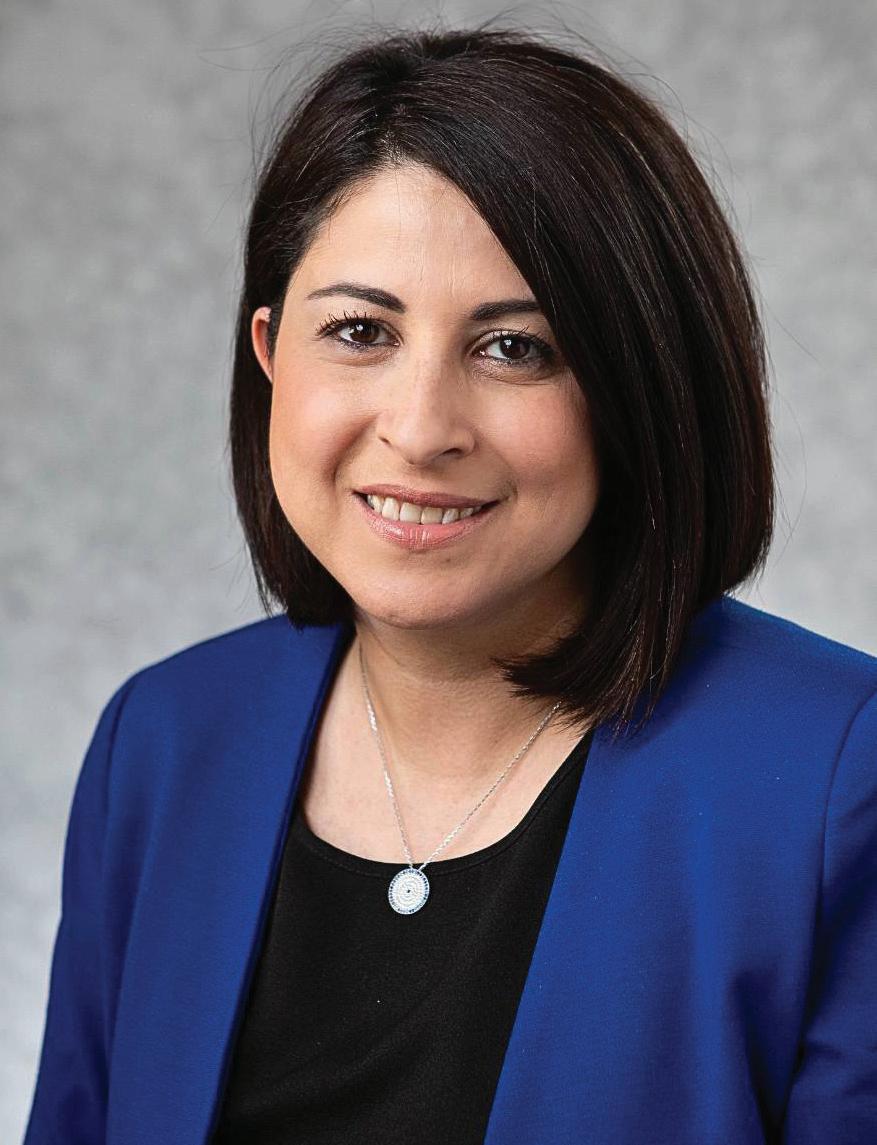
What: MVE-Lab Pitch Night
Where: City Opera House
When: May 19, 5pm-8:30pm (meet and greet first; pitches start at 6pm)
Who: Anyone can attend for free (registration requested)
More info and to register: gvsu.edu/mve



and busy season ahead.
TCBN: Let’s start with something on a lot of minds. At some point could this federal cost-cutting threaten the airport’s terminal expansion?
Klein: The easy answer is ‘always,’ regardless of administration. But the [Federal Aviation Administration] reauthorization bill passed 18 months ago, so funding requirements had been set, so it just comes down to annual appropriations, and the recent bill for aviation is identical to the reauthorization bill. So, the irony is we’ve had one Democrat bill pass and now for the continuing resolution the Republicans passed it.
TCBN: What’s the logic behind airports appealing to both parties?
Klein: It’s an industry that’s needed. Airports are a major part of the nation’s [gross domestic product]. So, the overall funding from all the traditional programs like airport improvements are all there, and now the normal discretionary money is there. So now we’re just competing for that discretionary money, and we haven’t seen that kind of funding since 2006, so we will compete very well. The one thing we’d really like to see from FAA and [Department of Transportation] is faster decisions on projects.
TCBN: We’ve talked about those 110 airports that cannot stay afloat without government money for years. Any hope for those Essential Air Service airports finally going away?
Klein: Right now I don’t see any change. The amount that’s funding them keeps coming. That’s $400 million in funding that was supposed to sunset a long
and Sault Ste. Marie.
TCBN: And what about the tariffs? I keep hearing air travel has already suffered.
Klein: Our first quarter was outstanding. The seats in our market are the highest it’s ever been in our history. What we’re seeing is a strong, healthy leisure market. So, when you see airlines cutting, they’re cutting in business markets or lower-end leisure markets. Areas higher in leisure markets like northern Michigan, Colorado, the East Coast ... we’re not seeing many cuts and, in fact, real increases in seats for this summer.
TCBN: Remind folks why that’s so critical.
Klein: It’s simple economics. When we get more seats and supply, we already have the demand, so that lowers overall airfares, and the more we use it, the more opportunities we get for additional air service.
TCBN: And you have some recent news on a new airline?
Klein: Yes! Jet Blue is joining us, serving the Boston market starting June 5. What’s interesting about that is we now have three carriers serving Boston. There are only 23 airports having that kind of competition for Boston, so we’re competing very well in that market. That makes seven airlines here at TVC, with 20 nonstop routes. When you look at last July to January and again January to July, we were number one and I believe we will again be number one in the country in increased percentage of seats in a market. We are really doing well nationwide.
TCBN: What’s the news from the other carriers?
Klein: Every one of our markets is seeing some type of increase, whether it’s a larger aircraft or a seat increase. Even our New Haven route was a Saturday only and they’ve added a Wednesday route. We’ve seen better connections for Sun Country connecting us more to the West Coast. We met with Delta and had a big discussion, and they’ve added bigger airplanes to Minneapolis, LaGuardia and Atlanta. With American we’re seeing mainline aircraft, and not just regional aircraft for Charlotte, Philadelphia, Dallas and Washington, D.C. And United is now using mainline aircraft for Denver routes.
TCBN: You’re always confident about the future. I wonder if you’re surprised by the outcomes of a month or a quarter?
Klein: Per the numbers we’re seeing and the advance reports we get, I think we have a pretty good pulse on what’s coming. I could be surprised for sure, but I don’t think this is the year. There’s some hesitation in the market, but people are still going on vacation. Some are making decisions more last-minute, but they will come.
TCBN: How did spring break turn out, particularly with the parking challenges?
Klein: Allegiant had a lot of extra seats that season to Arizona and Florida, and then we got the extra snow. It started our last week of February, which is typically the slowest week of the year, but this year was very busy. Locals are realizing they can fly out of Traverse City, and with the amount of snow here, people really wanted to get out of town. We filled up our parking lot of 1,400 places and then filled over 80 spots in our fire lot and then 50 spillover into the rental car lot. We even had a plan prepared for securing some parking from Costco, but it turned out we didn’t need that. And that prompted us to think about what is the number of parking spaces
we will need going forward? We’re looking at adding 500 spaces, which would go north of Costco as an economy lot and use a shuttle from there, hopefully this fall. Assuming we get approval from buildings and grounds, we’ll go through the bid process, get bids late summer, and start construction this fall.
TCBN: What else is new at the airport?
Klein: Our cell phone lot is being paved with 35 spots so people don’t park at the airport’s curb front. We have three lanes, one for loading and unloading and two for passing through. We ask that people use the cell phone lot and wait to get called by their travelers and then go pick them up. Hopefully that will be completed by Memorial Day. And then our car rental ‘ready’ lot had 214 spaces and we’re going to almost double the capacity of that. They needed additional capacity and that will also be done by Memorial Day. We have a terminal roof project underway, as we’re replacing the membrane roof on all the flat roof areas. We’re also redoing all terminal lights to LED and later this year updating all HVAC systems in the current terminal.
TCBN: And what about your expansion?
Klein: We’re almost to 50% designed, and we’ve hired The Christman Company as our construction manager at-risk. Once we pass 50% design, we’ll break things down into packages for bid, with bid numbers in likely September and then start wrapping up finance packages and looking to the bond market in November time frame.
TCBN: At what point will we be able to really see what the new terminal is likely to look like inside and out?
Klein: You can get a good sense on our website, but after 50% you can really start to see the future, and that will be in the next 60 days.

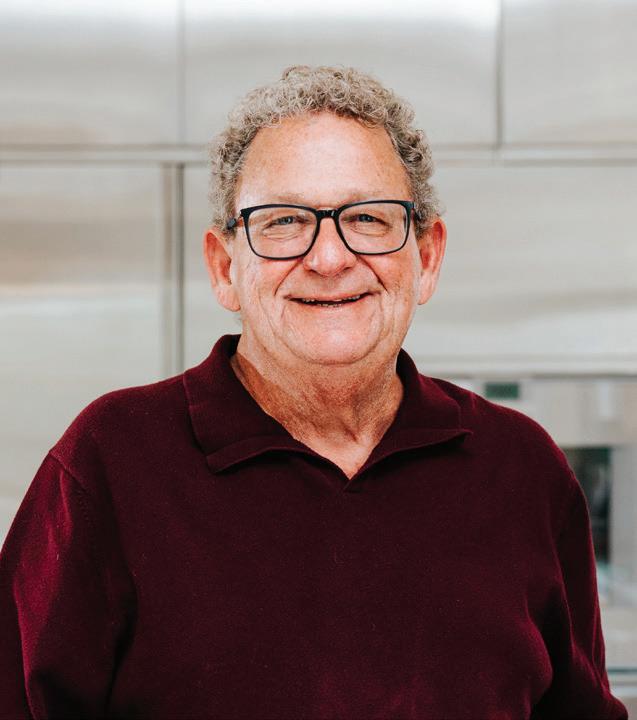




We’re

Here’s the deal. The right insurance should help you feel confident and comfortable. I’m the right good neighbor for that. Call me today.
Like a good neighbor, State Farm is there.®


Choosing the right contractor is crucial to ensuring a smooth home improvement project. Unfortunately, the industry is full of horror stories about subpar work, delays, and scams. To protect yourself, it’s important to recognize the warning signs that may indicate a contractor isn’t trustworthy or competent. Here are key red flags to watch for when hiring a contractor.
AT
a program of Goodwill Northern Michigan (2889 Aero-Park Dr, Traverse City)

$10 entry
A reputable contractor should always be licensed and insured. Licensing ensures the contractor meets state and local standards of competency, while insurance protects you from liability if a worker is injured on your property. If a contractor cannot provide proof of both, it’s a major red flag. Always verify that they have the proper credentials before proceeding.
es from satisfied clients. If they can’t provide either, that’s a red flag. Checking references or viewing past projects can give you a clear picture of the contractor’s quality and reliability. A reputable contractor will be happy to offer this information.
While everyone loves a good deal, an estimate that is significantly lower than others should raise suspicions. The contractor could be cutting corners, using cheap materials, or lacking the experience needed for a high-quality job. It could also indicate hidden costs might emerge once you’re committed. Always get multiple estimates and beware of bids that seem too good to be true.
While a deposit is standard, be cautious if a contractor demands a large upfront sum before any work begins. This could signal financial instability or even fraud. Upfront payments vary, always agree on payment terms and ensure they are clearly outlined in the contract.
A written contract is essential for defining the scope of work, project timeline, and payment schedule. If a contractor is hesitant to provide one, it’s a major red flag. A detailed contract protects both you and the contractor by setting clear expectations and reducing the likelihood of misunderstandings.
First impressions matter, and a contractor’s behavior during initial meetings reflects their overall professionalism. Tardiness and poor attire are signs of potential issues down the road.
Some contractors may try to convince you to skip the permit process to save time or money. This is a serious red flag. Permits are often legally required to ensure safety and compliance with local building codes. Skipping this step can result in fines, safety hazards, or additional costs to correct unpermitted work. A trustworthy contractor will ensure that all necessary permits are obtained and that the project complies with local regulations.
Silent auction, tasty Hors d’oeuvres, local spirits and fun, with over $1,000 in prizes all supporting a great cause.
-$500 Gift Card to the Boathouse Restaurant
-Floating Water Mat from Action Water Sports ($550 value)
-$100 Goodwill Northern Michigan Thrifting Spree!
WED, MAY 7 • 5-7PM Recess is brought to you by


Be wary of contractors who pressure you to make quick decisions with tactics like “limited-time discounts” or “sign now to secure a deal.” Reliable contractors understand that home projects are significant investments, and they will give you the time you need to make an informed decision.
Poor Communication
Communication is a key factor in any successful project. If a contractor is hard to reach, avoids answering your questions, or doesn’t return calls or emails promptly, consider it a red flag. A trustworthy contractor should be transparent, accessible, and responsive to your concerns. Poor communication often leads to project delays and mistakes.
No Portfolio or References
A reliable contractor should have a portfolio of past work and be willing to provide referenc-
Online reviews are an invaluable resource for gauging a contractor’s reputation. While a few negative reviews are normal, a pattern of poor feedback is a strong indication of consistent problems. How the contractor responds to negative reviews matters; professional contractors will address issues constructively.
Hiring a contractor is a significant decision that requires careful consideration. By being aware of these red flags, you can avoid common pitfalls and ensure your home improvement project goes smoothly. Always research the contractor, ask the right questions, address communication expectations, and trust your instincts.
The Home Builders Association of Northwest Michigan is here to help you navigate the process of building your dream home. Our members possess the local expertise and experience to guide you through every step, from initial planning to final construction. Learn more at hbagta.com/

With over a decade of sales and design experience, Jodie Schwandt has brought her expertise to Bay View Flooring since late 202 Helping clients bring their design visions to life, her passion fo creative solutions and personalized service has made her an invaluable part of the team. We sat down with Jodie to get her insights on life at Bay View:
“I absolutely love my line of work because I get to utilize my expertise and creativity to help clients achieve their dream home, remodel, or just a new floor refresh. I get excited when I get a new set of blueprints on my desk. I really enjoy cultivating relationships with my builder accounts and making sure that we are a trusted partner for their clients. Whether the client is remodeling or building a new home, we manage the whole flooring process from start to finish.”











“I always put my trust in Shaw Floors. My go-to for hardwood is the Expressions collection from Shaw. I have many builder accounts that have used this wood for their clients and we always get rave reviews. For carpet and custom area rugs, I always recommend Shaw Floors as well. Their warranties are the best in the industry.”
“I am very proud of the work we did at Koti Vacation Rentals in Williamsburg. Our team completed twenty cabins that included tile work for all of the bathrooms and LVP for the floors. We only had a small window of time to complete this, but we were done ahead of schedule. I was also part of a complete remodel of all of the Interlochen Arts Academy dorms and the Kresge Auditorium.”
“My favorite new product is the Canopy line from International Flooring Company. The quality is outstanding, the colors are beautiful, and the prices are just right.”
“I’m excited to show off our new tile gallery once it’s complete, along with the upcoming changes in our showroom. These updates will give our space a fresh, unique experience unlike any other flooring store in Traverse City.”
“Before you begin your flooring search, it’s helpful to save inspirational photos of floors or styles you admire. This allows us to better understand your vision, narrow down options, and make the entire process less overwhelming.”
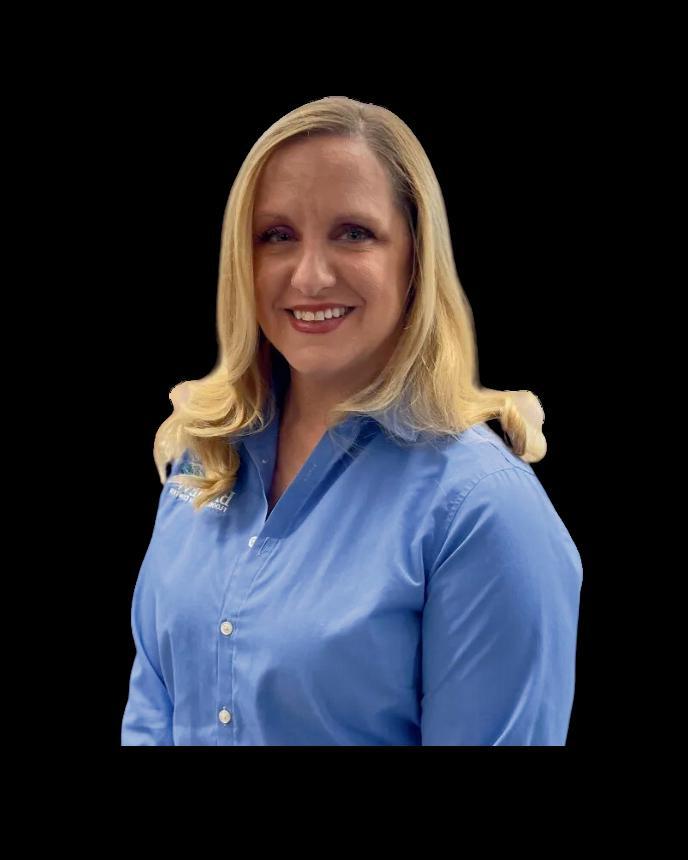



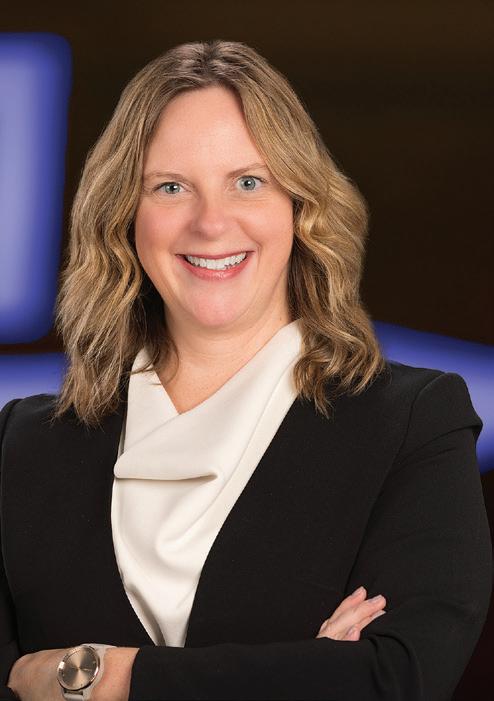

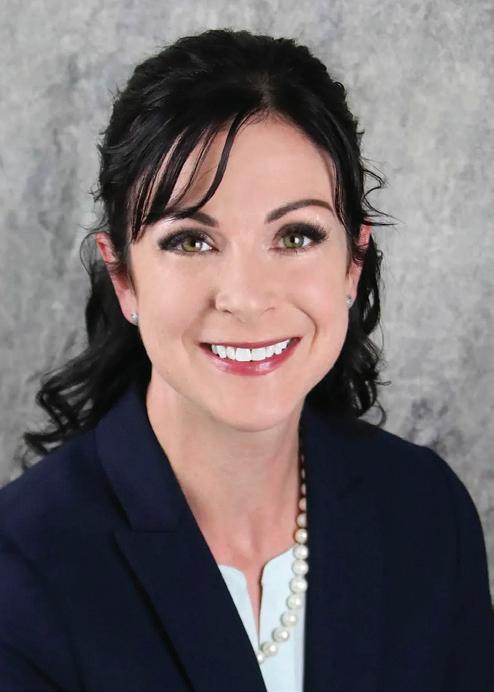


1 - Kelly Dunham joined 4Front Credit Union in Traverse City as its chief culture officer. With more than two decades of human resources and operations leadership experience, Dunham oversees the human resources strategy, and learning and development initiatives. Previously, Dunham served as the executive director of the Bay Area Transportation Authority.
2 - Luis Pardo has joined 4Front Credit Union in Traverse City as its chief experience officer. Pardo leads the strategy and activities of the credit union’s branch network, contact center, and member experience. Pardo brings more than 25 years of experience in banking and financial services to the organization.
3 - Dr. Tara Mager has been named the next superintendent of the Northwest Education Services intermediate school district. Mager is currently superintendent at Clare-Gladwin Regional Education Service District. She has 20 years of experience working in public education.
Grand Valley State University’s Traverse City Regional Center at the University Center announces the following:




4 - Heidi Fite, certified physician assistant, has joined the Master of Physician Assistant Studies Program as an affiliate professor. Fite has been a registered dietitian for more than 20 years and a physician assistant since 2011, spending the past 10 years working in primary care at a rural health clinic outside of Traverse City.
5 - Patrick Smith , assistant professor, has been named the Traverse City site director and assistant program director for the Master of Physician Assistant Studies Program. Smith has guided physician assistant students since 2011 and has been part of the Traverse City faculty since 2017.
6 - Katie Treston-Torney , certified physician assistant, recently joined the program as an assistant professor. Treston-Torney brings a wealth of clinical experience to this new role, having previously worked in orthopedics, trauma, surgery, and surgical critical care in Traverse City.
7 - Mike Frye, M.D. , has been named the new president of Munson Physician Network, effective June 2025. Frye will oversee clinical and operational performance across all Munson Healthcare outpatient clinics. Frye brings an extensive background in leadership. Most recently, he managed physicians and large teams in his role as senior vice president and group medical officer at SCP Health.
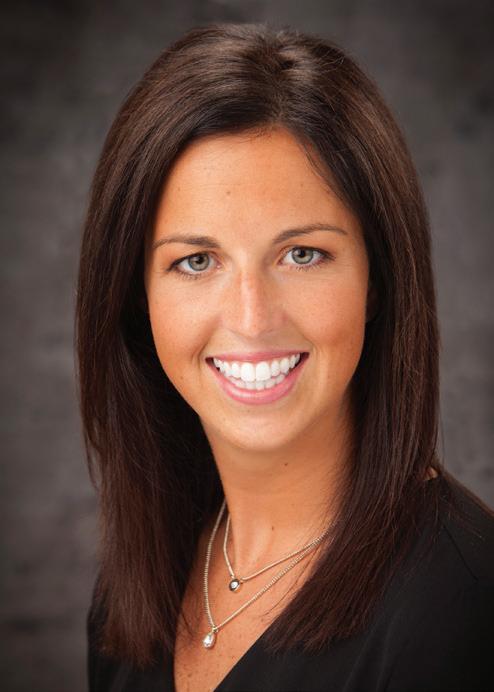

8 - Shelly Guernsey , a holistic wellness coach in Traverse City for 10 years, recently became a certified naturopathic practitioner. Guernsey specializes in treating the whole self and therapies that are unique to women.
9 - Michelle Manley , D.O., has joined the direct primary care team at Table Health in Traverse City. A board-certified family physician, Manley specializes in the management and prevention of chronic conditions, women’s health, breastfeeding medicine, and osteopathic manipulation.
10 - Mindy Lopus has joined Traverse City Horse Shows as food & beverage director. Lopus brings decades of hospitality experience to her new position, where she oversees VIP dining, concessions, and special event catering.
11 - Greg Miesch has joined The Homestead in Glen Arbor as its new executive chef, overseeing the food and beverage programs for the resort’s five restaurants, weddings and receptions, meetings and other special events. Miesch comes to the resort following stints at several major restaurants and bars in the Midwest and event companies dedicated to private dining experiences.




12 - Michael Bodus has joined the sales and design team at Floor Covering Brokers Carpet One in Traverse City. Bodus brings a background in customer service, merchandising and sales, and will focus on residential remodeling and new-build projects.
13 - Steve Cadwe ll has joined Sonny’s Body Shop in Traverse City as a detailer. Cadwell brings a strong background in the automotive industry to his new position.
14 - Steve Rittenberg has joined Sonny’s Body Shop in Traverse City as an estimator. Rittenberg brings more than 28 years of hands-on experience in the collision repair industry to his new role.
15 - Logan Sanders has joined Cherry Republic as business development manager. Most recently, Sanders was vice president of sales and operations at The Homestead in Glen Arbor.
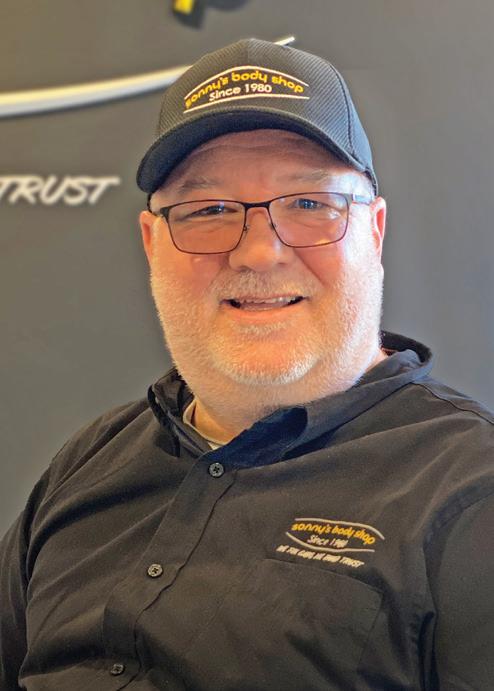



16 - Ad am Zeigler has been promoted to senior machinist - low lot/high mix division at Dutchman Manufacturing Company in Traverse City. Zeigler has played a key role in bringing the company’s newest machining technology online, ensuring enhanced production capabilities for complex, custom-engineered products.
TentCraft, a Traverse City manufacturer specializing in custom pop-up tents and event industry products, announces the following:
17 - Tyler Burmeister has been promoted to manager, inside sales & enablement. Burmeister has been with the company for 13 years.
18 - Steve Damman has been promoted to manager, outside sales & strategic growth. Damman has been with TentCraft for 10 years.
19 - Amanda Kappele has joined TentCraft as the go-to-market manager, focusing on promoting and expanding the product line and customer experience.




20 - Lesley Sly, a certified public accountant, has joined the company as senior accountant.
21 - Sue Brown is the new director of community resource development for The Salvation Army of Traverse City Corps. Brown brings 25 years of nonprofit senior management, leadership, and fund development experience working for several nonprofits throughout the community to her new role.
22 - Andrew Buthker has joined the Traverse City Philharmonic board of directors as treasurer. Buthker is a certified public accountant at Plante Moran in Traverse City.
23 - Liz Short recently joined Goodwill Northern Michigan as its new major gifts officer. Short brings extensive experience in philanthropy and donor engagement and most recently worked in advancement at Michigan State University.
Please send Newsmakers by the 10th of the month to news@tcbusinessnews.com












The International Affairs Forum Blue Tech Business Community Session at NMC included leaders from the planned Freshwater Research Innovation Center, Traverse Connect, NMC Strategic Initiatives, Discovery Pier, Great Lakes Water Studies Institute, FLOW (For Love of Water), NMC Office of Possibilities, and 20 Fathoms. IAF convened the session with John C. Austin (pictured left), who is widely regarded as the originator of the term “the Blue Economy” and as a champion of scalable, sustainable growth in our region.



across Michigan
be honored in Lansing as a
Counties’ County Commissioner Academy
of the
The Commissioners were presented with a certificate of their accomplishment by MAC Board President Melissa Daub of Wayne County.


Support staff in these fields directly employed by qualifying employer (such as Central Dispatch Operator, Custodial Staff, etc.), retirees that retired from an eligible employer, full or part time employees. If you have questions about qualification, contact the Mortgage Department directly at 800-678-4968, ext. 2105 or visit msufcu.org/heroesloan.2The $500 off closing costs offer is valid for new mortgages of $150,000 or more. Closing cost discount will be provided as lender credit. Offer cannot be used toward down payment or with any other discounts and is not available on home equity loans or lines of credit. All usual and customary fees will be charged to the buyer. Loans are subject to credit approval. Eligible properties include primary and secondary residences, single-family homes, condominiums, and modular homes. Home loans available for homes in the following states: MI, AL, AZ, CO, FL, GA, IL, IN, KY, MN, MO, NC, OH, OR, PA, SC, TN, VA, WA, and WI. Currently, construction home loans are available in Michigan and Illinois. Rates are based on creditworthiness, loan-to-value (LTV), property type, and other factors associated with your loan application. Your rate may be higher. This offer may not be transferred, sold, or replicated in any way, and it may not be combined with any other mortgage offers. Not an MSUFCU member? Joining is quick and easy! If you live, work, go to school, or own a business in the state of Michigan, you’re eligible to join.







